|
Tal
Ħandaq
Magazine 1978
Sports House
Reports Uganda
History
Memories

  Contributed by
Martin
Powell Old
Staff & Pupils
Contributed by
Martin
Powell Old
Staff & Pupils 1066
etc
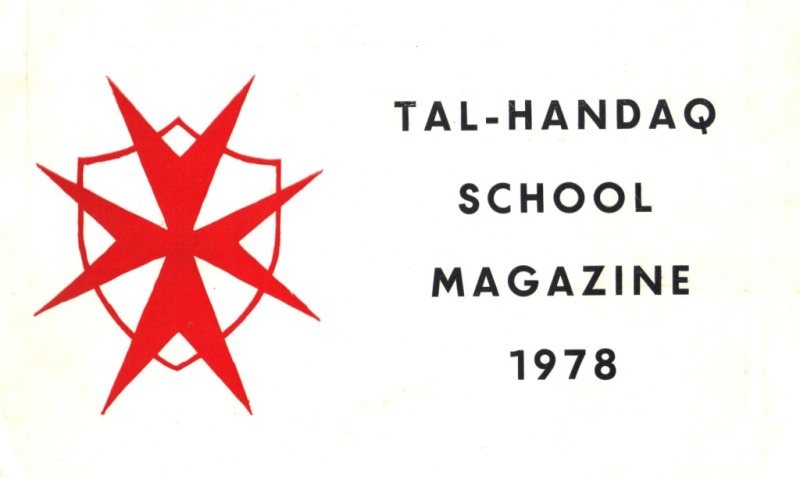
TAL-HANDAQ SCHOOL
MAGAZINE
1978
MALTA G.C.
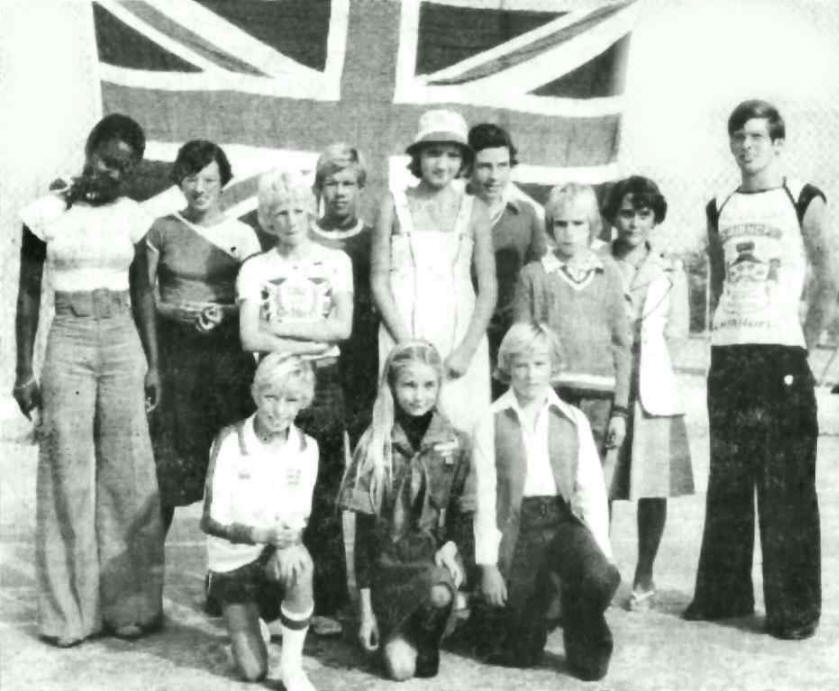
Jubilee Day 1977. The Prizewinners in the "Smartest Red, White and Blue
Outfit" Competition.
|
CONTENTS
Page
PRIZEWINNERS
5
STAFF CHANGES
5
HEADMASTER'S REPORT
6
VISITORS TO THE SCHOOL
8
PREFECTS
10
CHRISTMAS CONCERT 14
FASHION SHOW AND COOKERY DISPLAY 15
1066 AND ALL THAT 16
S.S. UGANDA CRUISE
24
C.C.F.
30
HISTORY OF TAL-HANDAQ
36
MEMORIES. OF MALTA
42
SCHOOL STAFF
48
SPORTS
55
HOUSE REPORTS
66
CREATIVE WORK
72
NEWS OF FORMER PUPILS
87
EXAMINATION RESULTS
90
|

cossack
VODKA
|
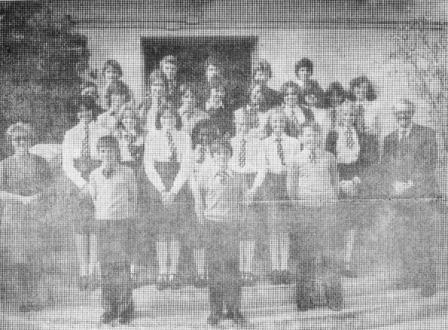
School Prizewinners., 1978 with His Excellency, the
British High Commissioner, Mr. Norman Aspin and Mrs Aspin.
FORM PRIZE LIST 1978
LOWER SCHOOL
1A Andrew Lane IB Eline Van Der Hert 1C Michelle Hipperson
ID - - Tracy Allen
Michael Garbett IE - - Gary Edwards 2A - - Mark Bennett 2B
Julie Burslem 2C Joanne Barrett 2D - - Sandra Spencer
3A Julie Lewington Mark Hart Mark Warner
3B - - Graham Dolman 3C - - Philip Basson
3D - - Stephen Hall Katrina Pechal
3E Stephen Brewer
UPPER SCHOOL
4J Francine Chapman 4K Louise Latham 4L - - Stephanie Judd
4M - - Angela Stapley 5J Christopher Sampson 5K Christopher
Norman 5L Susan Brooke 5M Simon Lane
6G Boys Andrew Basson
6G Girls - - Heidi Hipperson 6A U Penelope Davison
6A L Rosangela Mortimer
|
EDITORIAL
This is definitely the last Tal-Handaq School Magazine you will have the
privilege to hold and to read! (Do keep your copy somewhere safe, as in
a few years' time it will probably be a collector's item, and dealers
will be boring you by queuing at your door, offering prices which will
run to four figures). It's not a bumper bundle, as so many of our pupils
have left, but those who remain have tried to preserve the standard of
previous editions.
As you will notice, reading the Headmaster's report, and those from the
Houses, on Sport, Drama, C.C.F., etc., we have managed to keep going in
the final year, with all the usual Tal-Handaq exploits: "Business as
usual" has been the rule.
In this last magazine we have included a history of the School, the
first part being an extract from the 1953 "Royal Naval School" Magazine
by the then Headmaster Cdr. A.J. Bellamy. The continuation of the story
has been written by Capt. M. F. Law, who has had a long association with
the school. Still in nostalgic mood, there are also some memories
recounted by Miss Jacquee Yule, some time Headmistress of Tal Handaq,
and Miss Lily Harris Candey, also an ex-teacher.
I would like to thank Mr Aquilina, Mrs. Briffa and Grace Graham for all
the typing; Miss Shone for the Art Contributions and Mr. Goss for
rounding up the sports reports. Thanks must also go to Mr. Mule for his
help and to the advertisers for their support.
I. DICKINSON
STAFF CHANGES
During the final year, there have, obviously, been few changes of staff.
However, at the end of the Christmas Term, Miss Anne Nelson left the
school, after having been a member of the Needlework Dept for the last
three years. Miss Nelson is now working in London. The other leaver was
Mr. Frank Kitson, who taught woodwork, who left the island after living
and working in Malta for many years. Frank is now living in Norfolk with
his family.
Present pupils at Tal Handaq are often heard to complain about School
Transport; this vivid memory from Mr. G.L. Leach, a one-time pupil at
the Garrison School, should interest them:
"Transport.... ..consisted of mule-drawn ambulances,
which were very much like the covered wagons one sees in
the Wild Western Films I remembered many a time when
the mules got out of hand and shied and reared and we kids just sat and
held tight."
|
|
HEADMASTER'S REPORT MARCH
1978
During the past twelve months the reduction in the size of the
school, foreseen in my 1977 report, has taken place. At the time
of writing there are 350 pupils. Some of them will leave before
July, so that at the closure we may expect to have about 300 on
the roll. In the past year 143 pupils have joined the school,
364 have left.
Fortunately there has not been a comparable reduction in the
number of teachers. Although six members of staff have left
since the last report the school continues to enjoy the benefits
of a high staff /student ratio: many of the teaching groups are
small; in the Upper School the full programme of options for
public examinations has been maintained; teaching space is more
than adequate; there is no shortage of equipment; in the Lower
School there are no classes of more than twenty pupils.
Consequently, we are relieved of many of the problems and
pressures which apparently beset schools elsewhere while,
happily, we are big enough and sufficiently well-staffed to keep
the ranges of educational and sporting activities which for a
number of years have been enjoyed at Tal Handaq. So we approach
the end of the school's life, if not with a bang, certainly not
with a whimper.
Last summer's public examinations showed that standards,
generally, were being maintained. The 'O' level and CSE results
were particularly creditable: the new grading systems (quite
properly) discourage any talk of failure, but, if we use the old
nomenclature for our comparisons, the 1977 'pass" rates and
number of actual subject 'passes' were the
best since 1970. After the 1976 figures the 'A' Level results
were rather disappointing, if to some extent explicable, but the
January 1978 examinations produced another crop of satisfactory
performances |
The figures are as follows:
Candidates Entries
CSE 105 475 465 graded including 83 at Grade 1
GCE 'O' 112 333 259 at Grade C and above
GCE 'A' 18 37 17 passes
January '78
GCE '0' 31 33 23 at C and above
GCE 'A' 4 55 passes
In the Royal Society of Arts and Pitmans examinations I the
record over the year has been good.
Not surprisingly in view of the run-down in numbers there has
been little change in the School's organisation and curriculum
since the last report. It was helpful to receive support for our
judgement on such matters when Mr P. Armistead, Her Majesty's
Inspector, looked at the school in the Autumn Term. Mr
Armistead's visit, though short, was very useful in that he was
able to offer some suggestions for improvements in the remaining
months of the school's life as well as reassurance regarding
some of our decisions. A visit to a Service Children's Secondary
School was a new experience for Mr Armistead and, from such an
authority, it was pleasing! to hear his comments on the courtesy
and friendliness of pupils features which we would like to
think are the hallmark of Service Children everywhere.
Outside the classroom activities have continued on a scale 1
similar to that of previous years. The Combined Cadet Force has
been particularly active: members joined other CCF units
|
in camp at Hal Far; the
girl's section received special praise in the Contingent's
third annual inspection report; the Cadets have been well to
the fore in island walkabout competitions.
The Christmas entertainment took the form of a production of
"1066 and All That". The four performances, which were well
attended and well received, gave a chance to some fifty
pupils to appear on stage, with as many helpers, it seemed,
behind the scenes. The last night of the last Tal Handaq
musical might have been an emotional occasion for some of
those present. At least the number "We're Going Home" seemed
to be sung with special feeling.
This January thirty-five pupils joined the SS Uganda for a
ten day educational cruise which took them to Athens, Haifa
and Bodrum, before returning to Malta.
Tal Handaq athletes, gymnasts and games players (often the
same names appear in all the lists) have had a good year.
The School's Athletics Championships produced four new boys'
records and two new girls'; in the Malta National
Championships Tal Handaq Athletes collected fourteen Gold
and sixteen Silver Medals. Many of these successes can be
attributed to the enthusiasm for athletics fostered by the
5-Star Award Scheme, the Amateur Athletic Association's very
worth-while contribution to the cause of Physical Education.
Against adult opposition in the Services' Soccer League the
boys have acquitted themselves well; in the Minister of
Sport's "Soccer For All" competition the Under 16 XI is
leading the section with so far, an unbeaten record. In
girls' games the most notable feature has been the
improvement in netball which brought success in the League
and the tournament. Volleyball was a new addition to the
list of competitive sports; boys' and girls' teams gained
useful match experience particularly against some strong
Royal Marine opposition. |
In their games pupils have been helped in
the coaching given not only by Mr Ricketts and Miss
Loughran, the PE specialists, but also by other teachers
prepared to pass on their knowledge and sporting skills.
Indeed in all the activities outside the classrooms,
sporting and cultural, pupils have good cause to be grateful
for the help and encouragement of their teachers.
School climate is notoriously difficult to measure:
examination successes or sports results can always be set
out in their most flattering form; from the Headmaster's
office it is easy to insulate oneself from the rest of the
school, bury oneself in routine paper-work and proclaim that
all is well. I hope that I shall not be accused of doing
just that when I say that the success and reputation Tal
Handaq enjoys, depend largely on the pupils. With very few
exceptions, our Service Children and the sprinkling of
"non-entitled" students are well-behaved, friendly and
cooperative. They work well (though many, I believe, could
work harder) and they play well. They are a credit to their
parents who, in their turn, encourage their children to get
the most out of the school and who make the task of their
children's teachers so much easier.
Throughout the year we have much appreciated assistance from
our Competent Authority, from the Officer in Charge Schools
and his staff, from separate Service establishments and
Ministry of Defence departments. At a time when resources in
manpower and materials have been much reduced we have had
particular reason to be grateful for the efforts made to
ensure that Tal Handaq did not suffer. On the school
premises we have continued to be well served by the team of
industrial and non-industrial employees whose loyalty and
cheerful co-operation have made running the school so much
easier. To all those who have helped throughout the past
year and who continue to assist us, my thanks.
*
*
* |
I should like to add a more personal note to this last
Headmaster's report. When I came to Tal Handaq I was
very conscious that it was a great privilege to be
appointed as Headmaster of a Service Children's School,
particularly one with such a high reputation and a
record of success. As well as being a privilege, it was
has been for me a great pleasure to serve here. The fact
that it has been so happy an appointment is due to the
support which I have been given by the senior members of
staff, the loyalty and skill of the teachers, the
willingness of the ancillary staff and above all to the
pupils (no less than 1600 I find, to my surprise, for
whom I have been responsible over the past four years),
who have been unfailingly cheerful and friendly.
To all those I have mentioned as well as those who, no
doubt, I shall remember I should have mentioned as soon
as this article has gone to press, my warmest thanks and
best wishes for the future. I hope, like me, they will
look back upon their time at Tal Handaq with affection
and regard.
During the past year we have been pleased to welcome the
following distinguished visitors.
His Excellency the British High Commissioner, Mr Norman
Aspin, CMG and Mrs Aspin.
The Commander British Forces Malta, Rear Admiral O. N.A.
Cecil, CB, and Mrs Cecil.
The Air Commander Malta, Air Commodore H.D. Hall, CBE
AFC MBIM and Mrs Hall.
The Chaplain of the Fleet, the Venerable B.A. O'Ferrall,
QHC MA Royal Navy.
The Director of Education, Malta, Dr Francis Chetcuti.
The Deputy Director, British Forces Education Service,
Mr. Peter Gaskell.
Mr Leon Goossens, CBE.
Mr Peter Armistead, HMI.
His Excellency the Israeli Ambassador, Dr R. Migdal |
VISITORS TO THE SCHOOL
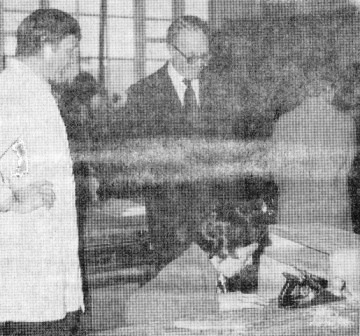
His Excellency, The British High
Commissioner, Mr Norman Aspin visiting the Woodwork room, with Mr
Lewington and
Andy Copeland.
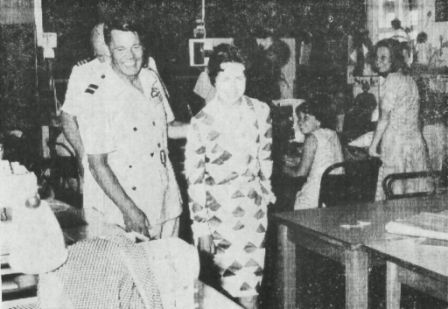
Air Commodore and Mrs Hall visiting the Needlework Room. |
|
PREFECTS 1978
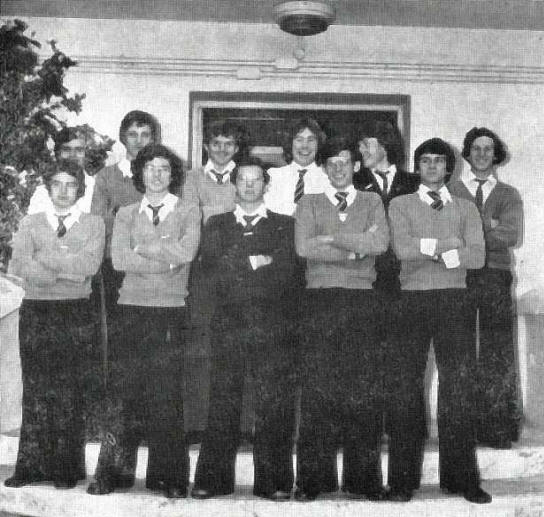
HEAD BOY: Derek Bonnar. | DEPUTY HEAD BOY: Andrew Basson
Andrew Basson Derek Bonnar Simon Crickmay Nicholas Hall Anthony Jackson
Simon Jackson Alex Groves Matthew Lane Stephen Oliver Ian Rowbottom
Robert Webb Patrick Standford |
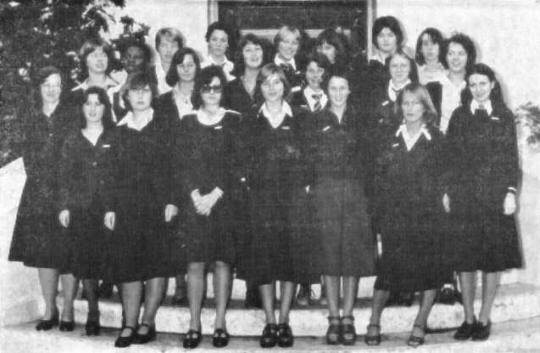
HEAD GIRL: Penny Davison DEPUTY HEAD GIRL: Patricia Ransom.
Jayne Barnes, Susan Bloom, Deborah Canham, Ella Chapman, Grace
Graham,
Angela Griffiths, Kim Hanns, Heidi Hipperson, Heather Merritt, Linda
Moody,
Rosangela Mortimer, April Morris, Susan Hewett, Maureen Simpson, Debbie
Smeeton,
Julie Stace, Anita Wardle, Belinda Young, Penny Davison, Patricia
Ransom,
Anne Dowie, Karen Hartley.
|
BERNARDS
THE MANS SHOP
A REMINDER
THE BERNARD CREDIT ACCOUNT SYSTEM
GIVES WORLD WIDE SERVICE, WITH SHOPS
AT HOME AND ABROAD AND A VERY COMPREHENSIVE MAIL
ORDER DEPARTMENT
PAYMENTS MAY BE MADE MONTHLY
THROUGH SERVICE OR PERSONAL SOURCE
ASK FOR DETAILS
18 THE STRAND, SLIEMA
45 ORDNANCE STREET, VALLETTA
26 SOUTH STREET, VALLETTA |
|
SULLIVAN SHIPPING
AGENCIES LTD.
SHIPPING
TRAVEL INSURANCE
THE EXCHANGE BUILDINGS,
REPUBLIC STREET, VALLETTA
Telegrams: SHIPFAST MALTA
Tel:22372,22780,22785,625127Telex
No: 301
(SHPFST-MT) |
|
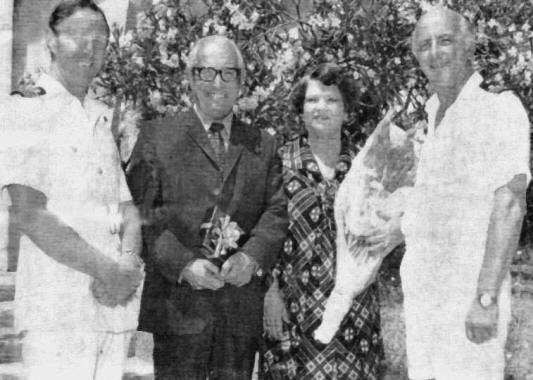
Mr Lawrence Bezzina, on the occasion of his
retirement as School Bursar, with Mrs Bezzina, Capt MF Law & Cdr GD
Stubbs.
|
THE CHRISTMAS CONCERT 1977
There were two performances of the Lower School
Christmas Concert given this year; one for the
school itself, and one for the upper forms of
the two Services' Primary Schools: St. Andrews
and Luqa.
A wide variety of carols had been chosen and all
the performers (and Miss Gordon and Mrs.
Winter-Goodwin) worked hard to produced a
seasonal show. Old favourites, such as "I saw
Three Ships" and "The Little Road to Bethlehem"
were enjoyed, besides the modern carols' "Mary's
Boy Child" and the popular "Cowboy Carol". Form
2A showed off their linguistic ability, in
singing the German carols, very competently, and
Form 1C provided seven soloists, one for each
verse of "The Seven Joys of Mary", with the rest
of the choir singing the choruses.
Rachel Brown deserves an individual word of
praise for her "Christmas Song", which she
composed and sang to her own accompaniment on
the guitar.
Besides the carols, there were various
traditional readings of prose and poetry. Jeremy
Starling described "Christmas at Home" and Anna
Boissevain, Linda Hart and Carol Hodgson read
the children's poem "The Night before
Christmas". Others described Christmas in other
lands and interpreted the meanings of many of
our own traditions and customs.
The concert was greatly appreciated by both
audiences and thanks must go to all the
performers and producers.
|
|
THE FASHION SHOW AND COOKERY DISPLAY
A large appreciative audience
packed the Tal Handaq School Hall on Saturday, April 22nd to witness
the final fashion show. Since last year's show the number of pupils
at the school have reduced considerably but this was not apparent;
neither the quality nor the quantity of garments displayed. Evan
Parry, being the only boy to model this year, deserves a special
mention for bravery! Once more Debbie Gibbons displayed her talent
with many superbly made garments.
In addition to the garments made by the pupils there were decorative
pieces of work on display around the hall, consisting of beautiful
appliques, soft toys and many other well-made items.
At the conclusion of the display Captain Law paid special tribute to
Miss Turner and Mrs Elliot without whose help and guidance the
fashion show would not have been made possible.
Besides the fashion In the hall, over in the domestic science rooms
there was a display of world cookery, arranged by Miss Wilson and
Miss Gray. This consisted of traditional dishes from those countries
where the pupils had at some time been to school. Maltese dishes
featured, as well as cookery from Singapore, Hong Kong, Germany and
many other lands.
FRANCINE CHAPMAN 4J
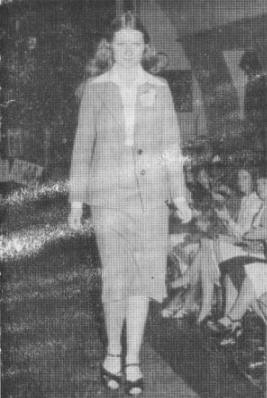
4th Year Francine Chapman parades in a suit of her own
making
|
The only boy in the Fashion Show.
Evan Parry modelling the trousers he made
himself.
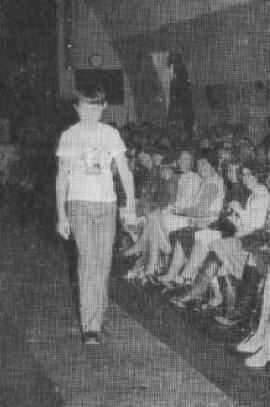
"FOR DISCRIMINATING HOUSEWIVES"
HIKAKE
SELF-RAISING FLOUR
ST.
GEORGE'S FLOUR MILLS
12
CHURCH
WHARF,
MARSA, MALTA
HOUSEWIVES CHOICE
SOLD EVERYWHERE
|
CRITICAL REVIEW FROM AN USHERETTE ON 1066
AND ALL THAT
"1066 and all that" was a very good school
production when the hard work and effort of
the staff and pupils could clearly be seen.
The opening was very effective as Steven
Triffit and his brood visited a museum and
displayed their complete ignorance of
history which must have upset the historians
amongst us. Leaving the rest of his family
to see the Chamber of Horrors, the father
fell asleep and dreamt of the time between
Julius Ceasar and the Industrial Revolution,
becoming physically involved himself. The
humour and occasional satire was outstanding
and the audience laughed heartily, even
those who didn't seem to understand some of
the contemporary jokes.
Those involved making the costumes, scenery
and applying makeup, deserve credit in
making the play extremely authentic. The
characters portrayed were all exceedingly
good, but those that deserve repeated
congratulations are those who seem to be
born actors, especially Henry VIII (and his
multitude of wives) the judge and the
colonel who were acted by Andrew Copeland,
who seemed to play these parts like a
professional. Billy Mack was also very good,
playing the parts of Christopher Colombus,
Robert the Bruce and King John. The narrator
had a very difficult task in maintaining the
audience's interest, while introducing the
various scenes and commenting on them
humorously, which, he had previously
confessed, even he did not understand some
of the witticisms.
The singing was very good and they tried
hard, but the sound could have been better,
as the music by the band was superb.
Altogether the varying scenes displaying
different aspects of history including the
humour and gentle satire was greatly
appreciated by the audience through their
laughter and applause. Therefore, the
production was of professional standard and
earned great praise from the official
visitors and the parents of the characters.
ROSEANGELA MORTIMER 6A
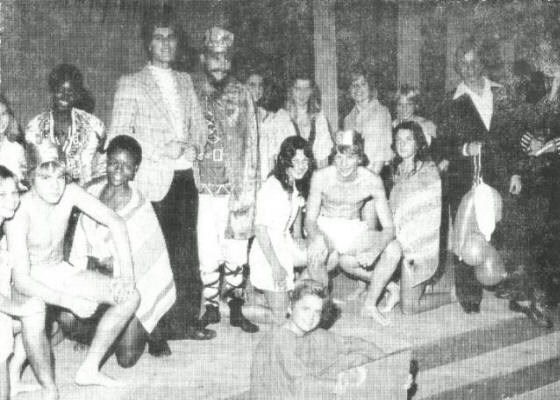
King Canute and his bathing belles.
CONFESSIONS OF A ROYAL WIFE
I thoroughly enjoyed being in the school play this year. It was not
the first time I had sung on stage, but ii was the first time I had
sung a solo. To my surprise I was not nervous about that it was
the game of musical chairs which we had to play which worried me.
I wag Katherine Howard Henry VIII's fifth wife. We six queens had
to skip around six chairs with our husband Henry (Andy Copeland).
One by one we queens were left without a chair. Henry then handed us
a chair in turn, sang a little solo, then went off - - stage.
But Henry always had to get to an end chair, and a certain wife had
to be left without a seat very confusing!
The best night for that scene (and the whole play) was the last
night Saturday. Everything went very well for the first time.
CAROLE LAMPARD -4M
1066 AND ALL THAT
On the first night of the play, I was getting ready to on stage for
my first scene with the rest of the boy's chorus! as Roman Soldiers.
The visor on my helmet was held together with a piece of wire at the
side and it suddenly snapped. After it snapped1 the visor kept
falling down, covering my eyes, so I couldn't see where I was going.
As I was just going, on for my scene) I didn't have time to fix it
properly, so one of the make-up girls used her chewing gum to stick
the visor on the helmet but this didn't work so I went on without a
helmet, and very small shield which was buckled and battered. The
audience didn't seem to mind.
DAVID DOVE
1066 AND ALL THAT
The cast is almost ready
The band begins to play
The actors are in position
The curtain begins to sway
The common man and family
Walk slowly across the stage
The guide forgets his lines
Miss Beckett gets in a rage
Along come the Roman Soldiers
Clad in armour shining bright
The second soldier falls over
What a terrible night
|
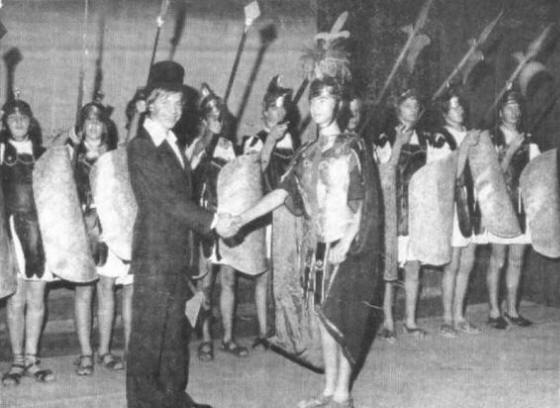
The Common Man meets Julius Caesar and the Roman Soldiers.
THE BEST SCENE IN THE PLAY
The Judge and the two policemen, were in the court room. Then the
Judge called the first prisoner, this was Christopher Columbus. When he
got to the box the Judge asked his questions, and most of the time he
just answered "yep!!" Then the Judge saw him chewing and said" This
isn't a chop house", so Christopher Columbus took it out of his mouth
and stuck it on the box, and started to stretch it, then the Judge asked
him more questions, then he got the American accent and started talking
like an American.
Finally he passed the sentence, and the Judge got out a gun and
started shooting at Christopher Columbus. Then when he calmed down he
called the next prisoner, which was Guy Fawkes.
The Judge asked him question, like why he wanted to blow up the
Houses of Parliament and how, and when he told him, the Judge gave the
impression that he also wanted it blown up.
Then the sentence. It was that Guy Fawkes should be burnt to
death on the 5th of November, so the policemen went to get him and he
fainted, and they pulled out a dummy and Guy Falkes crept round, and the
Judge said "Better luck next time."
JAMES RUSSELL 4L
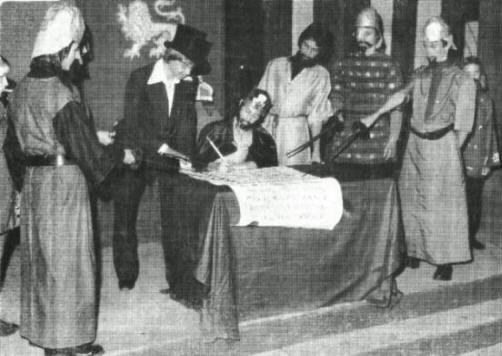
The Common Man helps King John sign the Magna Carta.
---------------
Next come the three monks
The first Monks halo falls off
The second had to stop singing
For he had a terrible cough
The drummer in the band
Put his foot right through his drum
Miss Gordon wishes desperately
That the night had never begun
The headmaster hides his head
He hides it as if in shame
Wishing that his invited guests
Had never even come
Next came the pantomime
It was a shocking sight
Mr Ricketts nearly dropped dead
For the cast could not get the dance right
Next came the bathing beauties
They were not too bad
But for one or two who were chewing gum
Which really made Mr Ricketts mad
The whole play was a mess
And that I must say
Some of the audience
Did not even stay
At the end we got a clap
That we did not earn
And you could see the audience
Trying not to yawn
Now that it is over
I will go to bed
And think about tomorrow
And wish that I were dead.
(Written in a state of depression the play was a great
success!)
BILLY MACK 4L
|
|
TAL HANDAQ SCHOOL BAND
The first appearance of a band at Tal Handaq was in 1973 (!
- see
School Concerts 1961-1968. Webmaster) when Barrie Menhams,
Judith Stansfield, Jeff Bonner and Bob Woollams combined to
accompany the very successful production of 'Oliver'. Since that
time various groups have been formed for particular functions such
as musical productions and concerts, but it is only in the last two
years that there has been a band playing on a regular basis.
The composition has also changed, for these earlier groups
consisted solely of staff from this and other Service Schools, while
our present ensembles contain several pupils. The staff who have
formed the backbone of all the groups are Jeff Bonner, (clarinet and
latterly Tenor Sax) a relative newcomer to the music scene;
guitarists Bob Woollams (Bass) and Dave Walker (lead/rhythm),
fugitives from the world of Rock and Blues respectively who happily
manage to reach a compromise for us; Trey Ricketts (trumpet) whose
Jazz Band experience is usually more in evidence than his Salvation
Army Band intiation, and 'Whispering' Paul Goss (Tenor Sax and
occasional clarinet) whose musical influence apparently came from an
association with his Uncle's Dance Band. Imported at great expense
from Luqa and St. Andrews Schools are another trumpeter, Edgar
Davison, whose exceptional expertise stems from a strict and early
Brass Band upbringing and flautist Chris Medlicott, renowned for his
flashing fingers and golden tone (he plays the flute quite nicely
too) All these are fortunately still with us and all the above were
seen performing as one (nobody has yet had the courage to say one
what) in the recent performances of '1066 and All That' and 'Joseph
and His Amazing Technicolour Dreamcoat', but the list would not be
complete without the inclusion of Geoff Collins yet another teacher,
who sadly for us departed with his aged drum kit for Germany, where
he continued his never
ending search for people willing to form Jazz Bands. Among many
incredible performances, undoubtedly his most incredible was as
impromptu drum solo during the hymn 'Mine Eyes Have Seen The Glory'
at a Tal Handaq Assembly which created consternation and hysteria in
equal amounts among the platform party and the band respectively.
The major productions which involved a band were 'The King and I'
and the very enjoyable and fast-moving show 'Oh! What a Lovely War',
but it wasn't until September 1976 that the band started to get its
present format. At that time, Tim Webb, who was the Bandmaster of
the R.A.F. (Malta) Band, kindly agreed to come in once a week and
give Brass tuition and the clarinetists in the school were
encouraged to take lessons locally As a result it became possible to
form a group consisting pupils and staff, although performances
during that year were restricted to brightening up assemblies. The
pupils involved were Penny Davison (cornet), Pat Ransom (trumpet),
Mi| Clarke, a disillusioned euphonium player who, after much
persuasion, took up the trombone and enjoyed remarkable succcess,
and Shona Campbell, Sally Procter and Andrew Morse on clarinet.
Although rather limited in their output, the bane performances did
prompt one of our visiting chaplains, the Rev. Peter Chapman, to
suggest that we might like to play a church. Surprisingly not only
was the suggestion to at his church at St. Angelo, but also to play
on a Sunday during a Service. As we had not yet got to the stage of
being overbooked we naturally accepted. The contract was duly signed
but as the engagement was not until October, we fortunately, had to
perform without our pupil clarinetists, of whom had left at the end
of the summer term. This service at St. Angelo was most successful
and proved to be the first of several most enjoyable monthly
pilgrimages.
Our pupil members in this last year have continued increase and in
addition to Pat and Penny, Bernie Fogarty
|
and
Chris Bennett (cornets), Peter Davison, David Webb and Evan Parry
(Baritones) and Mark Hart (trombone) have all flayed. Those staff
mentioned previously continue to form the nucleus of the band but now
included Gerry Gordon, a welcome addition both as an oboist and as a
conductor for our more ambitious musical renderings. We are also most
indebted to those members of the R.A.F. (Malta) Band who join us for
these Church Services, mainly to supplement our bass section, and these
include Bill Hodgson, Taff Parry, Tim Webb, Pete Vann and Graham
Cassells.
Undoubtedly, the biggest undertaking of the year was playing for the
school production of '1066 And All That' under the direction of Gerry
Gordon. This was the first time that pupils were involved in playing a
full orchestral score, and Penny, Pat and Mike are to be congratulated
on coping so well with such a demanding work.
Our most recent effort was in the School Concert held on 23rd May when
in addition to accompanying the first year's performance of 'Joseph and
His Amazing Technicolour Dreamcoat' we played a rendering of the Floral
Dance which was so unusual that I'm convinced that had we recorded it
before Brighouse and Rastrick, we could all by now be enjoying a
comfortable retirement ( in fact there were some suggestions that we
should retire).
In the two years that I have been running the band we have certainly
played a variety of music and seen several musicians playing a variety
of instruments. I would like to thank most sincerely all musicians
involved, whether they be staff, pupils or R.A.F. bandsmen, for coping
so well with my arrangements and for the very high standard they have
achieved as a group. Arranging suitable practice times amongst so many
other commitments has been the biggest problem, but judging by the
excellent atmosphere generated when playing, those involved have derived
a lot of pleasure and satisfaction from their efforts. I sincerely hope
that at least some of their pleasure and satisfaction has been shared by
both our captive and volunteer audiences.
JEFF BONNER
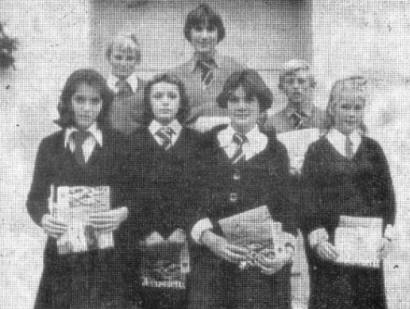
Competitors in the First Israeli Art Competition with their
certificates.
|
S.S. UGANDA CRUISE
During the afternoon of Wednesday llth January, a
party of 34 pupils accompanied by 2 staff from Tal Handaq School
embarked on the SS Uganda in Grand Harbour for an eight day (nine
night) cruise. The ages of the pupils were from 11 to 17, with the
majority in the 11 to 13 age group.
The SS Uganda became a school cruise ship in February 1968
and can carry over 300 fare-paying cabin passengers, and 920 school
pupils.
The school pupils are divided into six groups and, when at
sea, are timetabled into: Assembly Hall Periods, for lectures given
by the ship's education staff on the ports to be visited; Classroom
Periods, in which pupils carry on their own work programmes; Private
Study Periods, for writing diaries, postcards, letters, etc. Visits
to the Bridge and engine room are included in these sessions. Games
Periods, in which the pupils take part in deck hockey, deck tennis,
continuous cricket, quoits or swimming, are supervised by the Staff
Officer and two senior PE students.
Even before sailing, the newly embarked pupils had their
first Introductory Talk, giving them some "do's and don'ts". After
the 6 p.m. sailing, they had their first encounter with the
cafeteria, where up to 920 pupils can be fed in less than 11/2
hours.
It is a self-service type cafeteria, though the food is
actually served by a staff
Monday was spent in Israel. By 8.30 am we were all on
the bus on our way from Haifa to Jerusalem and Bethlehem. The 21/2
hour route was south on the motorway between the sea and Mount
Carmel, by-passing Tel-Aviv, and going via Lod and Ramla. We drove
through Jerusalem and on to Bethlehem where, after a stop at a
souvenir shop, we visited the Byzantine Church of the Nativity,
built over the rock-hewn cave containing the 14-pointed silver star
marking the traditional place where Jesus was born. After that it
was back to Jerusalem where we saw the parliament building (the
Knesset) with the giant candelabrum presented by the British
Parliament; the Shrine of the Book where the famous Dead Sea Scrolls
are kept, and the University.
We then left the bus and entered the Old City of Jerusalem by the
Dung Gate, and saw the old Western (Wailing) Wall, where there is
continuous praying, the El Aqsa Mosque and the Dome of the Rock,
both built by the Muslims in the seventh century and in use today
for Moslem worship.
We then walked the Via Dolorosa from Pilate's Judgement Place to the
Church of the Holy Sepulchre, past the Stations of the Way of the
Cross. The Church of the Holy Sepulchre marks the site of the
crucifixion and also the place where Jesus was entombed. Very little
of the tomb is visible today, and only 2 or 3 people can get in to
see it at any one time. We then returned to the bus at the Jaffa
Gate by going through the old streets and shopping area of
Jerusalem. Unfortunately there was no time for shopping!
We were then given a view of the Mount of Olives (a Jewish cemetery)
before being taken to the Garden of Gethsemane where Jesus was
disowned after the Last Supper just before He was seized by armed
men led by Judas. This was followed by a short visit to the Church
of All Nations. We were then taken to the Mount of Olives to look
back at Jerusalem, before going to the Garden Tomb; a tomb
undoubtedly similar to that in which Jesus's body was laid, and
claimed by some to be the rich man's tomb in which He lay.
ATHENS
As the train finally rumbled into Athens
station, a great sigh of relief was heard throughout the carriage
from the various members of Tal Handaq school. After a long delay of
waiting whilst a number of trains passed by all of us, with no
exception, we were eager to explore the market in order to spend
hard earned savings.
The streets seemed narrow and relatively crowded and passers
by glanced curiously at us we began our wanderings, and we in turn,
gazed expectantly about. People shouted as they advertised their
wares, cars driven by youngsters flashed by, whilst carts driven by
old men, trundled down the roads as the horse plodded on. We were in
the older parts of Athens, and as I gazed down the long narrow
street which twisted out of sight I could imagine the town awaking
to each fresh dawn and the sun glinting in panes of glass, sending
flashes of brilliant light winking on pools of water which may have
collected during the night, just as it still does and always will.
As we began to amble down the long road, people offered in
doorways and beckoned to us, various sizes and shapes of
miscellaneous pots were flashed before our eyes whilst brightly
coloured beads were pushed into our hands. I examined each one in a
single quick glance, shook my head slowly, smiled and passed on,
there were no hard feelings or angry words, everyone was happy. As I
continued walking 1 gazed into the mysterious depths of such shops
as I passed by. Brightly coloured lights shone upon shining copper
plates and as I gazed at them, deciding whether or not my mother
would in fact like them, they seemed to beckon and call me as to say
"Come in". I stepped over the threshold and trod quietly over the
sparkling floor tiles as I made my way over to the
An old woman
passed by and then stopped and re-traced her footsteps.
Ordinary plain black and white shawls were pressed into our hands
and a few of the boys grimaced as the old woman wrapped them about
their heads saying "pretty...very pretty...for you". Again we shook
our heads and passed on but it seemed she was not to be put off.
From there we were continually followed and at various intervals she
lowered the price but still no one obliged. It seemed that the
people of Greece were indeed insistent. Eventually one was bought
but even this did not satisfy her and we were followed for our last
few hours which was all we had left of our short stay in Greece.
Many photographs were taken and cameras flashed as their
shutters opened for a single split second whilst we fooled around
and posed in various positions. People looked on and laughed whilst
others sent us a pitying glance as they walked by.
Local foods from nearby restaurants and cafes were sampled as
we continued our ambling, munching as we continued on our way. It
was ironical watching the expressions which appeared on various
faces of separate individuals. Expressions of horror and delight, of
distaste and enjoyment, all of these appeared.
Well time had come to an end eventually, but for us only, for
the Greeks tomorrow would dawn as it would every day for years to
come in the future. Regretfully we began our trek back up from the
depths of mysterious darkness and of the interesting objects which
we were now forced to leave behind. Again we assembled ready for our
train ride back into Piraeus and yet again the ever present old
woman with her shawls, appeared again on the scene with her never
ending phrase "pretty, very pretty".
It seemed that our stay in Greece had reached an end and I
had thoroughly enjoyed it, but we were eager to reach the ship again
and explore our purchases so we turned back leaving the flea market
to bask in the late wintry sunshine.
MAUREEN SIMPSON 6A
UGANDA AND THE SEA
Uganda is a ship, a nest, a
colony. People swarm from one place to another, Like ants in a nest,
bees in a colony.
Uganda is a living organism, cast
into an alien Sphere, the sea.
Like an astronaut, protected from
nothingness By a double skin, or hull.
The sea is a deadly beauty, it is
like a scythe
It cuts down everything in its
wake,
But its beauty is loving, and
calm, warm and welcome
Uganda sails the sea, to explore
and assess, It lives, calm and warm life,
Ready for danger and deadly
reaction from the sea And we respect it.
ROBERT WEBB 6G
PARAMOUNT GARAGE
MOSTA
Telephones 41193, 43296
GENERAL HIRE SERVICE
--------- |
On Thursday, the sea was rough and some pupils (not all!)
were rather ill! That morning, for those who were able we had a talk on
the ship, a visit to the bridge and a class room lesson. In the
afternoon, there was a talk and two film, on Athens, and a period of
deck games. In the evening, the pupils again had the choice of a film or
a disco.
On Friday 13th, we berthed in Piraeus, the port of Athens, at 9 am. In
the morning we were taken by bus to Athens where we drove through the
modern city, before going up to the Acropolis to see the Parthenon, the
Caryatids and the temple of Athene Nike. After this, our guide took us
to a souvenir shop before returning to the ship. After lunch we took the
electric train into Athens and went shopping in Flea Market.
On Saturday 14th, there was an Emergency Stations Practice, when all
pupils assembled at their muster station and put on their life jackets
as they would go in a real emergency Also that day, there were two
classroom sessions, a private study session, a deck games session, and a
talk on Jerusalem and Bethlehem. In the evening, there was again the
choice o a film or the disco.
Sunday 15th included two films on Israel and the Holy Land. At 10 am
there was an Inter-denominational Church Service in the Assembly Hall,
and in the afternoon, the preliminary rounds of the interdormitory deck
hockey competi tion were held on the after sports deck. The boys' team
were unfortunately beaten but the girls' team won all their matches that
day and went through to the final rounds of the competition. In the
evening, there was a fun fair to raise money (about £68 were raised) to
pay for the prizes to be awarded at the end of the cruise.
We then returned to the ship, having been out for 12
hours.
On 17th January we had a usual day at sea a talk and films on Turkey,
as well as normal classroom, private study and games sessions. Some of
the party visited the engine room. In the early evening, we put a team
in for the Inter-party Quiz, but unfortunately the opposition was too
strong.
On 18th January, Uganda anchored off the small port of Bodrum in Turkey,
and the parties were ferried ashore by the local fishing boats. At
Bodrum there are several places of interest: the Castle of St Peter
(built by the Knights of St John), the remains of the mausoleum (one of
the seven wonders of the ancient world), a Greek Theatre, tombs in caves
and the local shops!
Unfortunately while we were there it was raining and all we had time to
see were the castle and the shops! In the evening, there was a fancy
dress parade and several of our pupils took part and won prizes. The
prize winners were: Simon Chapman (Traffic Lights), Linda Hart and Sarah
Gallaghar (Snake Charmer and his Snake), Kim Lawson and Eline van der
Hert (the Order of the Bath and Bubbles).
On Thursday 19th, after a morning of a classroom session, a
retrospective talk on the cruise, and deck games, the afternoon was
occupied with the finals of the inter-dormitory deck hockey competition.
Unfortunately, our girls' team was knocked out after a dubious
refereeing decision.
At 5 pm, the prize giving was held in the Assembly Hall. Tal Handaq was
represented by Heather Simpson who won the Deputy Captain's prize for
the best kept log book of the cruise. In the evening, there was a film
followed by the final disco of the cruise.
By 12 noon on Friday 20th, all pupils were home from their cruise with
souvenirs, dirty washing and memories which will last them a life-time.
HUGH RITCHIE Party Leader
particular shelf
on which they stood. But standing above, o its own, as if in a daze,
stood a single pot. The warrior which had been painted over the front,
held a spear as if in defiance to the world, the mocking smile upon his
face, caught my eye and I immediately knew that I just couldn't resist
it, had to buy it. I delved into my pocket for my money and drew it out
and handed the appropriate rates over to an old man who stood eagerly
behind the counter. I walked out of the shop feeling a deep sense of
satisfaction, well within me as I did so
Eventually I met members of the
school party, most were standing outside a pokey little shop whose
interior disappeared into darkness, whilst others held the leather hats,
which seemed to be on show in most shops, in their hands and spoke
earnestly as they bartered over the price with the old man who stood
nearby, watching. A general price was eventual, decided upon and there
was a great deal of laughter as hats were exchanged between hands and
individuals decided up their particular choice.
Again we walked on. By this time
we had reached the twist in the road. Tiny shops lined both narrow
pavements, all were brimming over with various goods, some were shining
and clear whilst others were small, dark and full dust. The road seemed
to continue for as far as the eye could see with leather goods, pots,
pans, clothing, hats, shoes, wonderful looking foods spraying forth
their tempting aroma beads, bottles of brightly coloured drink and
finally genet souvenirs which were to be found in most tourist areas, I
those could be seen either hanging from shops doors, displayed in
windows or spread over the pavements.
But this was the flea market and
not a general tourist area, objects which were either unseen or unheard
of were to be found here.
HAIFA
We arrived in Haifa at 8 pm on 16th
January on a Monday. We went to our disembarkation stations just over an
hour after getting up. We left the ship at about half past eight. Our
group went on bus number nine and we had a guide who was called David.
He was a very nice man and tried hard to get along with us, and made it
a good journey. We went straight from Haifa to Jerusalem. It was a long
and tiring journey which lasted three hours. However the seats were
comfortable and that made the journey a pleasant one. We did not stay in
Jerusalem but went onto Bethlehem where Jesus was born. On the outskirts
of Jerusalem we stopped at a shop. We were there able to go to the
toilets to everybody's relief. We were also able to buy drinks and
souvenirs. There I was able to get a ring made of silver and about four
or so things carved out of wood. I of course bargained for all my things
and saved myself quite a bit of money. We were only meant to stay there
for 15 or so minutes and we ended up staying for over half an hour. We
then went to Bethlehem where Jesus was born. We went down into the
manger where He was born. I enjoyed this as it is a place most people
want to see. The manger was underground and I had thought of it as being
above. A church had been built over it and it was called "The Church of
the Holy Nativity". We then got on our buses and went to Jerusalem.
We went inside the
old gates of Jerusalem and we the went up to see an Arab Mosque which
was gold plated are decorated with coloured tiles. It is the second most
important place to the Arabs after Mecca. From here we went to the
Church of the Holy Sepulchre, where Jesus may have been crucified and
buried. On the way I got what looks like Russian hat. Many of my friends
got hats similar, but mine was by far the best. We went from here to the
Mount of Olives. This was where Jesus was betrayed and taken away The
olive trees were all very old, and some are supposed date back to the
time of Jesus. We went from here to the other place where Jesus might
have been crucified and buried It was not all that interesting to look
at but it was good know that we knew there were 2 places where Jesus
could have been crucified and buried. From here we started our lot three
hour journey back, it was around half past four. On the way back our
guide who had talked most of the way to Jerusalem was silent most of the
way back, as it was too dark see anything. We sang some Israeli songs
and then he let us sing songs, we wanted over the microphone. We got
back the ship at around 8 o'clock and almost straight away had our
dinner. We had said goodbye to our guide who was both kind and good.
MARK WARNER 3A
ATHENS
When we had disembarked and got into our bus or coach
I at once fell into the magical atmosphere of Greece. Its amazing
architecture. Of course it was very different to what I had thought
it would be. I found Greece a really wonderful country. I was
surprised to see marmalade oranges growing at the sides of the road.
When we reached the place where the Parthenon is situated and saw
the amphitheatre I tried to imagine what it would have been like for
the Greeks in ancient times when everything was quite different with
chariots dashing by and having to visit the temples of the Gods and
Goddesses when it was said that strange monsters lived. I looked
round the ancient pieces of architecture in awe and wonder. When we
returned to the bus we were driven to one of the souvenir shops of
Athens. Then I saw the handiwork of the Greeks, it was just as
beautiful as I had been told and I bought some vases and plates.
Then on returning to the ship we had lunch. Later on in the
afternoon we went by train to the flea market where we shopped for
quite a while seeing more gorgeous examples of the Greek handiwork,
leather, pottery, brass, material, and wood. Then we travelled back
to the Uganda I was tired but happy. We had a few hours on the boat
then a few of us went out round the town for a while, had a drink
and something to eat then walked back to the ship. I wished we could
have stayed longer in wonderful Greece.
SARAH GALLAGHER 1A |
CCF
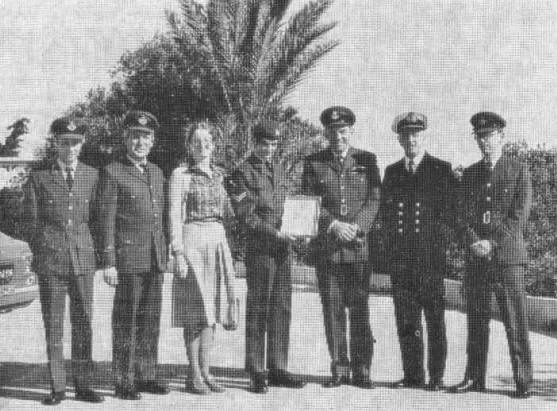
From
LEFT to RIGHT: P/O I.W. Hesketh RAFVR(T); F/L C.M. Laing RAFVR(T); SSI
Miss L. Curtis; Cdt Cpl S. Hill; W/CDR J.H. Carter RAF; CDR G.D. Stubbs
RN; F/L A.P. Allen RAFVR(T).
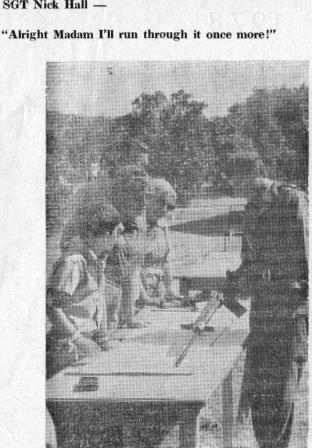
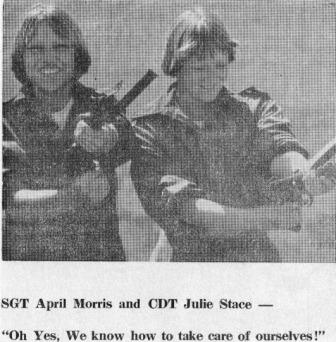
 |
OPEN DAY 1978
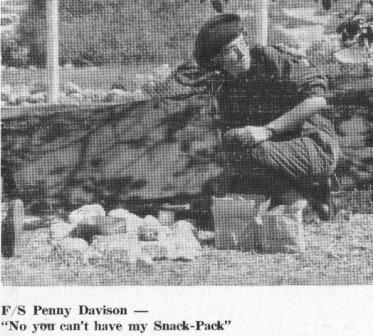
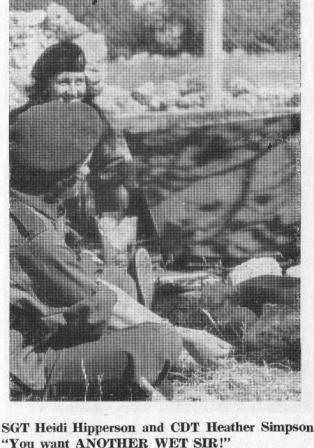
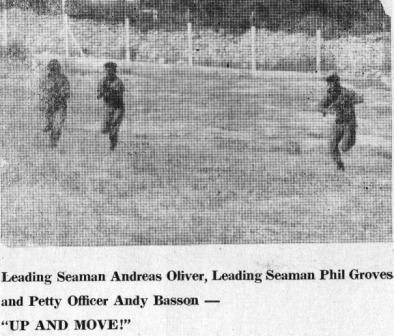
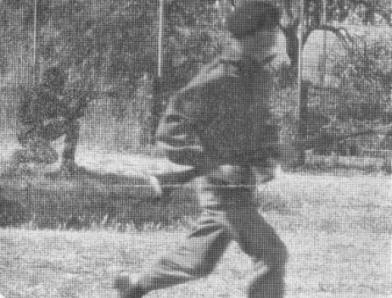
Warrant Officer Tony Jackson and Ordinary Seaman Judd "GO JUDD!!"
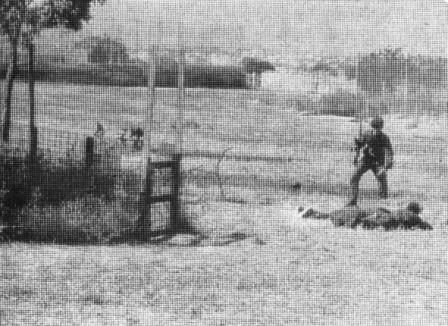
Warrant Officer Tony Jackson, Cpl Sue Bloom and a
Marine
"THIS ONE'S A GONNER!"
|
|
HISTORY OF TAL-HANDAQ
Few of the present members of the school
are familiar with the History of Tal-Handaq. We reveal
it here in this
final Magazine, from an account which
appeared in the midsummer 1953, Cdr. A.J. Bellamy. We
are indebted to Capt. M.F.
Law, M.A., Royal Navy, some time Head of
Mathematics and later Headmaster of the School, for a
continuation of the
School's History. |
|
I am frequently asked by visitors
to the school as well as by parents, how and when the Royal
Naval School came into existence. The service population of
Malta contains a considerable number who received their early
education at the School in pre-war days (two old pupils are now
on the teaching staff) but for the majority who know nothing of
our history, this excursion into the past may be of interest.
The education of the children of people who work takes them away
from the U.K. has always been a problem. In many colonies the
answer lies in the private school. Long ago, however, the
Admiralty realised that not everyone could afford private school
fees, and some sort of provision was made by them as long ago as
1880, when a Dockyard school was started in an old Dining Hall,
just inside the main gates of the Yard. Here some 30 to 40
children, mostly Maltese or Anglo-Maltese were taught the
rudiments of Arithmetic and English. The Dockyard Officers who
were sent out from England continued to send their children to
private schools and in those days few Naval people brought their
families to Malta. Most of those early pupils neither spoke nor
understood much English when they entered the School, but they
were taught so well that many won their way to good positions in
the professions or in Government Officers.
Even fifty years ago there were problems concerned with the
growth of the School. By 1904 it had outgrown its room in the
Dockyard and new premises (an old prison!) were taken over in
Prison Street, Senglea. About this time one of the
|
School staff (and later its Headmaster) was
Naval School master W. Candey. In fact, the Education Service of
the Navy has always provided the School's head, and, until
recent all the male teaching staff.
In Senglea the School grew steadily to about 250 children.
Children entered, as now, at the age of 5 and left at 14 when
the boys took the examination for entry to the Dockyard. The
School's troop of Sea Scouts started about 1910 very soon after
the movement began. The old records show that up to 1918 most of
the children entering the School were Maltese, but from that
time the proportion of English children grew appreciably and as
they increased the character of to school changed. In 1925 the
level of instruction went beyond the Apprentice Examination and
an 'Oxford Junior' class appears in the records for the first
time. This was the beginning of a serious effort to run the
upper part of the School on Secondary School lines as opposed to
a preparing ground for Dockyard apprentices. By this time, too,
the School had ceased to cater for the children of locally
entered Dockyard employees and had assumed its present function
of providing education on English lines for children who would
normally have gone to English schools. There were now many
Naval, as well as Dockyard children.
Verdala appears on the scene in 1929. By then then were once
again too many children for the Senglea building to hold and an
old Royal Marine barracks and ex-prisoner-of war camp at
Cottonera in St. Clements Bastion was taken over
|
This we now know as Verdala
School. Here were buildings which would hold 350 children, but
the records for 1932 show only 150 boys and 70 girls attending.
This number increased steadily to 530 in 1938, when there were
three classes of infants, five of juniors, and six secondary.
Boys and girls were taught separately in the secondary school in
those days. The School also catered for the schooling of the
Dockyard apprentices-in-the evenings. Top storeys were built on
the main Verdala Blocks, in 1938. In those days school lunches
cost 6d, and the tuck shop sold lemonade at 1d a bottle. The
houses for the boys were the same as at present, but the girls
had their own houses named Anne, Victoria and Elizabeth.
The school entered its first School Certificate candidate in
1932. He failed, but in 1938 ten certificates were won. This
story of growth and development was sadly interrupted by the
outbreak of war in 1939, and eventually all English wives and
children were evacuated from Malta. The School struggled on in
yet another home at St. George's Barracks, but eventually shut
down completely in September 1912.
During the war the Verdala buildings were badly damaged and the
main hall was destroyed. Part of the School was used as a
prison, and another part became H.M.S. Euroclydon, and was used
to house the crews of submarines.
After the war English families started to come back to much
damaged Malta and education again had to be provided for their
children. Early in 1946 the old Headmaster was sent out to see
how much was left of the old School equipment, after the
bombing. He found seventy-five desks (we still use them) and
some mouldering books most of which are now museum pieces, but
this was not a very encouraging start for the re-opened school.
Re-open it did on 16th May, 1946 with 55 children in two
requisitioned houses on the water's edge at
|
Ta' Xbiex. The staff was two Instructor
Officers and their wives. Children under seven couldn't be
accepted because no one could teach them. Soon after the School
opened it became clear that the two houses in Ta' Xbiex would
very quickly became inadequate and another search was made for a
new building. Various country houses, hotels, etc., all proved
unsuitable, but in September 1946, a disused Army Barracks at
Tal Handaq was discovered. This had been built during the war to
resemble a Maltese village, in order to give camouflage from the
air. However this unpromising and remote spot had room for lots
of children and so work began on it to fit it out as a School.
So in January 1947 the Dockyard School (children's Section) came
to Tal Handaq; and ever since there has been a continual race
between the Civil Engineering Department of the Dockyard in
preparing new rooms and children coming along to occupy them. In
1947 the name of the School, now completely separate from the
Apprentices' School, was changed to Naval Children's School.
The Headmaster's report for 1948 said that no more children
could be crammed into Tal Handaq (150 extra have been put in
somehow since then!) and in 1949 the old School at Verdala was
repaired and restored as a school. The rebuilding of the hall
was not completed until 1951 and meanwhile the present hall had
been built at Tal Handaq.
The School's record year for growth was 1952 when 300 additional
children were absorbed, the total number reaching 1947 by the
end of the year. This year also gave us our new name "Royal
Naval School" - a more dignified and inspiring title for an
organisation which is unique among schools. Now it would seem we
have reached the limit of growth in our present buildings. Where
next?
|
A recent appeal in the local
press has brought me a number of letters of reminiscence (at
least one of which appears elsewhere in this magazine) as well
as one or two useful leads to original sources of information,
and in this respect I am particularly grateful to Mr W. Bellizzi
of Balzan and to Dr Depasquale, Librarian of the National
Library, Valletta.
The following notice appeared in the Malta Government Gazette of
31 May 1820:
British National School Burmola 20 May 1820.
Wanted, a Governess to instruct the female children of this
Institution in Needlework, Reading, Writing and the Rudiments of
Arithmetic.
It is likely that this school was a semi-private venture
but it is noteworthy that it was situated at Burmola (Bormla),
better known to us as Cospicua. When it was started, 1 do not
know, but since by 1804 there were already 28 English craftsmen
in the Dockyard (1) it could have been very early. In a magazine
article (2) D. Degiorgio tells us that it was situated near the
first Dockyard Chapel, beneath the Sta Margherita Arches, and
that it was later moved by Rear Admiral Sir Lucius Curtis to a
drawing office (already converted for use as the 'War Game
Room') under St Michael's Bastion. It was about this time that a
proposal that a Schoolmaster be appointed from England was made
by the Dockyard Chaplain, the Rev. M. Tucker. Admiral Curtis
does not seem to have been strongly in favour ('never having
been consulted on the subject') but he concludes his forwarding
letter, (3) dated 10 January 1846, by begging 'strongly to
recommend that the person sent should be married, as from
experience
|
I too well know that the temptations are so
great that very few single men escape the baneful influence of
liquor, which is so cheap that they soon become inveterate
drunkards.. '.
The most interesting of my finds, however, has been following
Article in the Malta Times dated Tuesday 19 October 1858:
DOCKYARD SCHOOL IN MALTA
The friends of education will be glad to learn that arrangements
have been made by the Lords Commissioners of the Admiralty for
the establishment of a school in Malta for the use of children
(boys and girls) of persons employed in the Her Majesty's
Dockyard a Naval Establishments in this Island, and an afternoon
and evening school for apprentices.
An excellent schoolmaster, Mr Sullivan, has been appointed who
is already arrived from England and the school, we hear, is to
be opened on the first of November next. The Admiral
Superintendent is appointed visitor and the Committee of
Management is to consist of the Master Shipwright, the
Superintending Engineer and the Chaplain, who will be charged
with the immediate superintendence of the school, and will take
it in turn monthly visit the school daily, if possible, to see
that it is properly conducted. No female child will be permitted
to remain in the school after the age of fourteen years, nor
male child after the usual age of apprenticeship; a payment of
six pence a month is to be made to the Crown for each pupil for
the use of stationery, books, slates The method of education is
to be that adopted by National Society in their schools and in
those of Majesty's Dockyards at home, as nearly as found
practicable.
|
The office of examiner will be
performed by the Naval Instructor of the Flagship, or the Senior
Naval Instructor present, and in the event of the fleet being
absent, bu such other properly qualified person, either a
clergyman or a graduate, who will be called upon to draw up a
report upon the school for transmission to the Admiralty
Inspector of Schools England.
A further paragraph in the next edition of the newspaper
apologised for the omission of any reference to
'The Reverend B. Howe, Chaplain to the Yard, who has the honour
of first proposing the school to the Admiral Superintendent in
March last, Admiral Stopford readily took up the suggestion and
forwarded Mr Howes letters to the Admiralty, supporting them
with all this influence'.
I think we can take this as firm evidence of the opening of the
first official Dockyard School (and direct fore runner of Tal
Handaq School today) on 1 November 1858, making the school
almost 120 years old. In the preceding article, Commander
Bellamy took up the story from the move of the school
(originally in or near the Chapel by the sail loft in the Sta
Margherita Cospicua, area) to the old dining hall. I now
continue where he left off.
(1) Appendix 3 to typescript entitled HM DOCKYARD, MALTA toy
W.A. Griffiths copies held by Mr W. Bellizzi and he National
Library, Valletta.
02) L-Ideal No. 68 Nov. 1970 page 22.
(3) Appendix 10 to paper in (1) above.
|
You may have noticed that although he
mentions Verdala he still talks about the 'school', in the
singular, because at the time there was just one all-age RN
Children's School, housed on two separate sites, some but not
all of the primary children being at Verdala. It was about 1954
that it proved possible to house all the primary section at
Verdala and also about that time a separate Verdala Headmaster
was appointed, although he was still responsible to the
Headmaster, Tal Handaq.
The huge total of 1470 pupils, referred to by Cdr Bellamy, was
for the two sections of the school combined, only 700 of their
being at Tal Handaq. He might have been surprised had he known
then that in 1960 the numbers were to reach 1050 at Tal Handaq
and 1200 at Verdala, those at Tal Handaq being housed in
buildings which were expanded from a theoretical capacity of 600
in 1958 to 800 in 1960. I was on the staff at the time and
although I can't really remember where all those pupils went, I
do know that there were a few 'floating' classes with no rooms
of their own. Tal Handaq has always quietly got on with the job
of achieving what most people would think of as impossible
without making a fuss about it.
In those early days besides being all-age it was also what
newspapers today describe as 'all-in', although not strictly
speaking comprehensive in the usual sense of that word. The
school was divided into separate grammar and modern sections but
even in those days transition from one to the other was quite
easy. As early as 1964 the school was reorganised on
comprehensive lines, which meant that the grammar/ modern
division was removed altogether (although some streaming
remained) and from the Fourth Year upwards pupils had individual
timetables with a wide range of optional
|
subjects which they could take at
a combination of different levels, as they do today. This
change, when it came, was comparatively small and undramatic, in
sharp contrast to the upheavals going on in the UK system.
'Comprehensive' is in some ways what Tal Handaq has always been
(and could only be) and the word does not have the unpleasant
overtones with which it unfortunately so often seems to be
associated at home.
In the sixties, after the closure of HM Dockyard and with
Malta's approaching independence and the consequent British
run-down (yes, it's been going on for a long time!), numbers
began to decline, but never as fast as predicted, and in late
1966 there were still nearly 900 pupils at Tal Handaq. The Sixth
form was larger than ever, although still small by UK standards,
and examination results in CSE and at 'O' and 'A' level improved
steadily in both quality and quantity, reaching 433 'O' level
subject passes in 1967 and 80 'A' level subject passes in 1968.
Even up to 1971, with numbers in the range 700 to 800, there
were regularly over 50 'A' level subject passes a year, and
remember this was in a comprehensive school which was notably
'bottom-heavy' (seven First-Year forms but only three in the
Fifth Year) and to which parents frequently (and not
surprisingly) did not bring out their older and more
academically inclined children.
1969 saw the demise of single-Service schools and the formation
of a joint organisation called the Service Children's
|
Education Authority. This was something else
which had comparatively little effect on Tal Handaq as ever
since the war it had been the only Service secondary school on I
island and, although run entirely by the Navy, it catered! the
children of parents of all three Services as well as of
Government civilians. Its only effects were to take away the
Headmaster, Instructor Captain Malkin, to become a full-time
administrator (as Officer in Charge Service Children's Schools
Malta, Naples and Tripoli), replacing him by an Instrunctor
Commander (myself), and to change the name from Royal Naval
School to Service Children's School.
The rest is comparatively recent history, but mention should
perhaps be made of a little hiccup during the Christmas holiday
1971 when, a few days before term was due to start, it was
announced that all Service dependants were leave Malta within
two weeks and the schools would not re-open. I can perhaps leave
the effects of this short-notice closure to your imagination
(they were described in the 1973 magazine), but we certainly did
go home and the school reduced to an empty shell in Malta, a
vast number of ominously rattling packing cases at Bicester,
several large boxes of documents at Eltham and a staff, still
technically on strength but dispersed all over the UK, somewhat
plaintively enquiring what was to happen to them next. Pupils
scattered to the four winds and regrettably there was could do
to help them.
|
Two terms later, in
September 1972, we reopened, somewhat reduced in size and with
about 50% new staff and 75% new pupils. Numbers reached 600 by
September 1973 and stayed about this level until early 1977 when
the final rundown began to bite, causing numbers to decline
steadily to the final total of just over 300.
Finally, as my main source of material for this article has been
old school magazines, and particularly Headmasters' Annual
Reports, I should like to pay tribute to former- Headmasters by
recording here as many of their names as I have been able to
discover.
|
Headmaster W Candey |
-1918
|
|
Headmaster Govier |
-Mar 1925 |
|
Headmaster H E Hindmand MBE |
Mar 1925 -
Jun 1928 |
|
Headmaster G H Rickers |
Jun 1928 -
Dec 1932 |
|
Headmaster Lieut W F Plant |
Nov 1932 -
Dec 1937 |
|
Headmaster Lieut F J Giles |
Dec 1937 -
Sep 1942 |
|
Instructor Commander A H Miles OBE (later
Instructor Captain, CBE)
|
May 1946 -
Jan 1951 |
|
Instructor Commander A J Bellamy OBE (later Instructor
Rear Admiral, CB) |
Jan 1951 -
Apr 1954 |
|
Instructor Captain B J Morgan (later Instructor Rear
Admiral, CB) |
Apr 1954 -
Apr 1959 |
|
Instructor Captain D E Mannering
|
Apr 1959 - Aug 1963 |
|
Instructor Captain L Broad |
Aug 1963 -
Aug 1966 |
|
Instructor Captain H C Malkin (later CBE)
|
Aug 1966 -
Jan 1970 |
|
Instructor Commander M F Law (later Captain)
|
Jan 1970 -
Apr 1974 |
|
Commander G D Stubbs |
Apr 1974 -
Jul 1978 |
.* L-Istorja Tat-Tarzna by K.E. Galea (Il-Hajja 1973)
|
 |
|
MEMORIES OF MALTA |
|
| We are delighted to
include some personal reminiscences of the School, from an
ex-teacher, Miss Lily Harris Candey, whose father was Headmaster
until 1918, and who taught at the School herself after the
Second World War. |
|
My father was a Naval
Schoolmaster. We came to Malta in 1902 where he (my father) was
attached to the Dockyard School, then as you know, inside the
Dockyard gate in Senglea.
In 1904 the school was removed to the old prison in Strada
Prigione (the names were all Italian in those days). Now you
will be interested to know that it was the children's and
apprentices school in one, because the children's opened at 9.00
a.m. till 12.00 started again at 2 p.m. till 4 then the staff
had to go back to teach the apprentices from 6 to 7.30 p.m.
The children were those whose fathers were employed in the
Dockyard (the lowliest labourer was entitled to send his
children to the Dockyard school) and of course those of any
service men. The children entered at the age of five years, went
on until 7th standard (age 14 years) the girls left, the boys
had an examination. According to their position in the result
list, so the lads could choose their trade engineer,
electrician etc. On leaving school these lads attended the
Dockyard by day to learn their trade left the yard at five
o'clock and back to night school from six to seven thirty.
Many prominent men in Malta are old Dockyard School boys, who
later were able to go to Lyceum and/or University. The Garrison
Schools stood, apart from St Andrews, at Santa Margarita,
Cospicua and Ricasoli.The children
travelled by brakes drawn by lovely great horses. Schoolmasters
were in uniform. The Dockyard School Staff consisted of
Headmaster, Assistant (both Naval) three civilian male teachers,
two Maltese male teachers, extra for night school, and three
female teachers for Infants, Standards I and II. Many
interesting things happened for the Dockyard School children
the Visit of King George and Queen Mary, also the German Emperor
with his great moustaches for these occasions we all lined the
route from Marsa to Valletta. The laying of the foundation stone
of the breakwater by King Edward, where the school children went
over to sing, under my father's baton (he was the music master).
|
Once the dear old Duke of Connaught had his
birthday here. The school children were all invited to the
Palace for tea. On leaving we had to pass along in front of the
Duke and Princess Pat, who gave the girls each a doll and the
boys a sailing boat.
The Admiral of the Dockyard would call in whenever he liked.
Each month a member of the school Committee would be on duty.
This committee consisted of Admiral Parson, Engineer Captain,
Admiral's Secretary and Civilian Secretary as far as I can
remember. The Naval Parson (who had a fine house in Bighi) came
to the school for Religious instruction to the Protestants
Canon Cassar, the Roman Catholic Naval Priest took care of the
Catholics; two of the masters were of this denomination.
Eventually my father became Headmaster, being relieved in 1918.
After being in England with the family until they died, I
gravitated back to Malta, where I was extremely lucky to get a
job at the Royal Naval School, Headmaster Commander, later
Captain Miles. The staff then consisted of Naval Schoolmasters,
their wives and those like myself, locally entered people
Great fun, we had few text books, when these were ordered from
the Admiralty they took so long in coming that we all had other
ideas by the time they (the books) arrived. We did our best with
our own brains!
However, later the seconded people arrived, and it was most
amusing to note their chagrin to find how they were expected to
work. You see they all wanted "a free hand" they didn't
understand "Navy," much less Pink books, white cards, correct
reports, with a care not to hurt the feelings of the parents.
That's how it was when I was at Tal Handaq. As the school was
enlarged the Infants and Juniors went to Verdala, myself with
them.
All together I spent seventeen very very happy years, my last
Headmaster being Instr. Commander Newbery.
Lily Harris-Candey
|
RANDOM MEMORIES
I joined the Staff at Tal-Handaq in September 1949. It was then
known as the Royal Naval School and although Verdala had been
opened to accommodate the Infants and Juniors, not all these
classes had been absorbed, so Tal-Handaq had not only a Grammar
and Modern side (the word Comprehensive was not known in those
days) but four classes of Juniors and about the same of Infants
the staff consisted of Naval Instructor Officers and locally
entered teachers, many of whom were service wives.
During the war the school had been an Army Ack Ack Site and most
of the ground floor windows were iron barred - all rather
sinister. Very few of the buildings were two storied and there
was nothing beyond where the Hall is now - just the fields and
no through road. The buses all parked in what is now known as
the Staff Upper Car Parking Area so the size of the school can
be gauged by this fact. Some of these buses are still on the
road.
Captain Miles was the Headmaster and his time was marked by the
building of the present School Hall until then, the ground floor
rooms of Block 2, still separated by folding doors, accommodated
all the school at assembly.
In 1950 just before Captain Miles was relieved by Commander
Bellamy the present hall was completed soon after this the
first Tal-Handaq Musical Production, "The Princess JU JU" was
produced by Mr. Walker. Later, Mr. Cresell produced "She Stoops
to Conquer" and "The Rivals". From then on Tal-Handaq continued
to put on a major show annually at either Christmas or in the
Spring Term. For many years it became the tradition for school
and staff to take part in Gilbert and Sullivan operas these
were very successful.
I can remember the visit of the first H.M.I's; as there were
still Junior Classes in the school it fell to my lot, not only
to take English in the O and A Level classes but once a week I
descended to Form I Junior where I taught Geography. One day
during their visit I had an inspector at my VI Form lesson in
the morning, and that afternoon the same gentleman visited me in
Form I. At the end, he greeted me with "Miss Yule you are a very
versatile lady" an unsolicited bit of praise I felt.
We had many more inspections while I was at the school and as
Senior Mistress it was my duty to accompany the senior woman
inspectress round the girls' cloakrooms etc. To my horror I
found one lady's principal interest was the length of the chains
in the lavatories. By and large, I doubt if we ever found these
visits too over powering.
I cannot count the number of staff who came and went - most
stayed for several tours but one domestic science (cookery)
teacher came, saw she had to cook on oil stoves and requested
to be released from her contract. This department had many homes
and it was not until the present
block was built that they graduated to gas and electric cookers
at one time this department was housed in the men's Staff Room
and cooking was done on a Rayburn type stove!
We have had pupils of all nationalities. And when NATO was based
in Malta we had Americans, Greeks, Turks and Italians at one
time the American element was very strong. Not only were there
NATO pupils but also non-entitled ones whose fathers worked on
the Libyan Oil Fields. We then had an American teacher whose
special job was to teach American History and Spanish; she also
had to work out the "Grades" to be sent back to the schools in
the States.
I must also mention the school dinners, which for many years
were provided by NAAFI my chief memories were of being often
on duty on Fridays when there was a positive rush for the fish
and chips. Another speciality was a sort of jam sandwich fried
in batter a bit more substantial than the couple of prunes and
custard which often appeared.
There were also the occasional "Dramatic" events. During one
chemistry lesson there was a slight explosion and most of the VI
Form joined in the general upheaval but one studious type
solidly went on with his work. I need not add that he is now a
Research Chemist. On another occasion during a Christmas
Concert, two very gifted boys were performing on the piano and
violin suddenly the pianist threw a faint and collapsed on the
floor the violinist went on playing. Both have taken up
musical careers.
These 'Random Memories' cannot close without a tribute to the
industrial staff without whom the physical appearance of the
school would never have been maintained. For many years they
were controlled by Mr. Plant, an ex-British Serviceman, who went
out of his way to help up all before his retirement he was
awarded the B.E.M. To those individuals who remain I should like
on behalf of us all to wish them happiness and success in the
future.
JACQUEE YULE
|
IMPRESSIONS
"When I first came to Malta I looked disapprovingly at the dry
and barren land remembering the lush green countryside of
England."
"Tal-Handaq at first was a strange sight. It reminded me of
Colditz."
"I noticed straight away it had a friendly atmosphere. You have
to work hard and play hard and if you do you will soon realise
what a great place it can be."
"When I arrived at Tal-Handaq, I thought it was more like an
airport than a school. The P.E. Block was to me like a hangar
and the rest of the classrooms looked like lots of control
towers."
"On my first day at school in Malta, I heard all the nasty
things about Tal-Handaq. People said things like "You get the
cane for being late", and "Watch out for D.Ts." We all gave it a
special name "Colditz". I was petrified that I'd be going
there."
"I came to the conclusion that it was a prison camp, consisting
of tortures such as getting egg rubbed in your face and your
head flushed down the toilet by the sixth form. There was even a
teacher called Hitler and barbed wire round the fences."
"In this, the last term of Tal-Handaq School many pupils will be
thinking "Great! Fantastic!" '
"Pupils have always made up names about their teachers, and
teachers from this school also have nicknames, some funny, but
they are not meant to harm the teachers who work hard by day and
mark endless books by night."
"The teachers did not seem to bother about us 1st years very
much because we were so small, so we often did not get on well.
But it gradually got better."
"Tal-Handaq is closing this year (That's the only good thing
about it!). I do not like school as I cannot stand the buildings
or the pupils. The pupils normally reckon themselves hard and as
a result are good swimmers (their over-inflated egos keep them
afloat!).
LACHRYMA
VITIS
THAT IS THE
WINE
THOUGHTS ON TAL-HANDAQ SCHOOL
" it was back in 1978, I was going to a school in
Malta, called Tal-Handaq, I remember the teachers well,
especially the French Teacher what was his name? it
doesn't matter...... any way he used to tease me something
rotten, and the Maths Teacher was just as bad If he ever
found out which boy you had taken a fancy to, you can bet your
life you were in for a very embarrassing time."
"The work was hard, the homework plenty, the teachers nice and
not so nice. I plodded through the work, getting average in all
marks. The next year things began to perk up and work was more
interesting, and I started doing sports and played in the school
production of "1066 and All That", and I really enjoyed it. Then
I actually did not want to go home! My parents were astonished.
They would say: "Only a few months and you'll be back where you
always wanted to be," and now I could reply: "Just think - -
I've been here two years and now I want to stay!"
"Those were the days! School seemed to be much more fun compared
to schools nowadays. The teachers had a good sense of humour and
they used to make us work hard, but had a nice way of doing it.
One or two things I didn't like there were too many steps up
to the buildings and also the English class next to ours in
third year made too much noise while we were trying to work."
"In summer, when it was really hot, there was always a long
queue at the tuck shop and by the time you got there, there
weren't any drinks left."
"There are many memories that will remain with me for
a long time, of Tal-Handaq. But the most prominent was when it
rained and we were at a lesson in one of the Nissen huts, for
all the while there was a constant patter on the roofs and no
one could be heard at all. However, this was more unbearable
when it began to hail!"
TAL-HANDAQ
Coming straight into secondary school, and into the second year,
from primary school is quite a big step and a bit confusing. Tal
Handaq was the queerest looking school I'd ever seen (still is)
so this didn't help matters. Even today, after two and a half
years here, I can't tell the difference between 25P or ITS, 2Q
is the only one I know, because it was my form room in the
second year, not because I spent a lot of time in there at lunch
time! So on the first day or even couple of weeks, life at
Tal-Handaq was a bit confusing.
Once of the first things I couldn't get used to was calling the
teachers Sir or Ma'am, and another was having to stand up
everytime one of them entered |. classroom.
When, my brother and I, arrived home, after the first day, we
agreed that just about everyone at Tal Handaq had blond hair!
This was probably because both of us have dark hair.
Well it's the fourth year now and we'll all be leaving Tal
Handaq this year, but I'm sure we'll all miss it, no matter what
we may say of it at times.
|
|
FOR A GOOD ADVICE ABOUT
YOUR TRAVEL WORRIES
consult:
ED. T. AGIUS & CO LTD.
IA.T.A.
APPROVED AGENTS
242, REPUBLIC STREET,
(corner with Archbishop
Street)
VALLETTA
PHONE 625550
29243
Special offers
APEX WINDSOR TOURS
Forces Rebated Fares
on British Airways scheduled flights
WE GUARANTEE OUR CUSTOMERS PERSONAL AND
COURTEOUS ATTENTION. |
|
HELPS YOU KEEP FIT
WHILST YOU LOSE WEIGHT
A GOLDEN HARVEST PRODUCT
Telephone: 34382/32391
|
|
SCHOOL STAFF 1977 - 78
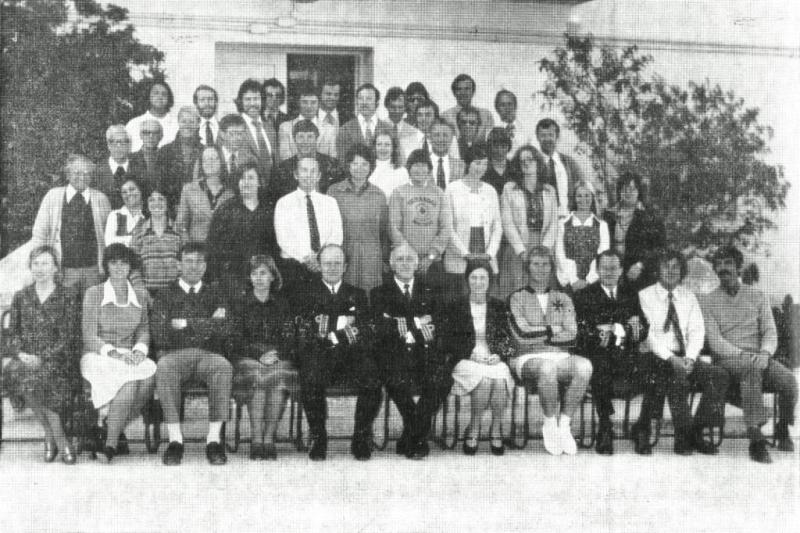
| Front row: |
S. Beckett; G. Gordon; B. Leonard;
I. Dickinson; Lt. Cdr. D. Nield; Cdr. G.D. Stubbs; M.
Sherwin; T. Ricketts; Lt.Cdr.
A. Richards; K. Winn; J. Clemens. |
| Second row: |
C. Aquilina; M. Briffa; G. Camilleri; N.
Ash; S. Camilleri; M. Caseley; D. Gray; M. Loughran; K.
Patterson; L. Curtis; L. Shone; H. Wilson. |
| Third row: |
W. Pawley; J. Booker; M. Turner; P.
Allen; W. Lewington; J. Rae; C. Laing; A. McHardy; M.
Holland. |
| Fourth row: |
J. Slide; H. Ritchie; C. Christmas; L.
Finnis; B. Woollams; G. Davey; P. Goss; M. Newton. |
| Back row: |
D. Walker; A. Latham; I. Hesketh; B.
Whewell; S. Bonnett. |
|
FIRST DAY Knowing my usual mad
last minute rush my mum woke me up half an hour earlier, so
I would still be ready in good time for going to my new
school! But as usual I was still eating my breakfast at five
minutes to eight. Unfortunately we were living in Sliema at
this time and during the night my dad had been called out by
the R.A.F. for one of their frequent exercises. So me and my
mum had to make our own way to an unknown school, in an
unknown place, or an unknown island, but finally we
succeeded and getting off the bus we found that we had a
long walk ahead of us up a dusty track (which looked like an
entrance to a farmyard). We arrived, and made our way to the
School Offices, had a chat with the Headmistress or rather
my mum did as all I was left to do was nod and say yes
occasionally. We finally came to the agreement of which
class I was to go in 2D. I'll admit that I was disappointed
but I soon realised that you can't come out on top all the
time!
I can remember walking into that class for the first time on
a Tuesday morning. Everyone looks at you and you don't
really know what to say or do. I've been to thirteen
different schools in my lifetime and still I don't know what
to do or how to react or even what to say. All I do is go
red, get embarrassed go shy and be nervous all at the same
time. But I try to act cool and undisturbed, but it never
works.
It takes a few days or even weeks to settle in and you get
asked questions about England as if they have never been
there in their lives before! But still I've really enjoyed
this school even when I was moved up to 2C I thought all my
old friends would call me a swot or something but they
didn't and I look up to them for that.
GILLIAN EVANS
|
MALTA
Malta
Where nothing goes right
Mosta,
Still stands the dome,
Buses,
Come they might
Bars
A home from home
School
The bane of life
Soil
Solid and lifeless as rock
Drivers
Accidents still rife
Dogs
Flea-Bitten under neither key nor lock
England,
Where we want to be
End,
What '79 will see.
CATHERINE JONES 3A
|
| WHERE DO WE GO FROM HERE?
Where do we go from here?
Where do we go when we lock up the doors,
And we sell all our things,
And we scrub all the floors,
And we pack all our kitbags,
And we wave our goodbyes ?
Oh! Where do we go from here?
Will you be going to Deutschland?
Will you reside in the land of the Rhone (sic)
And drink of the wine
And eat all the sauerkraut,
The sausage so long?
Oh! Where will you go from here?
Will you be going to Cyprus?
Will you be climbing the great Troodos range
And sample the sherry
The kebabs so strange -
And buy all the leather
The bags and the shoes?
Oh! Where will you go from here?
Will you be going to Hong Kong?
Will you be flying far off to the East
Where the locals are many
And give you a feast
Of chow mein and beansprouts
And chop suey, too?
Oh! Where will you go from here?
|
Will you be going to Blighty?
Will you be going back home on the dole Where the queue is all black And they're calling the roll
No dockers or miners
Just sacked teachers, who
cry, "Where does one go from here?"
TNR
EST. 1900
PHONE: C. 24193
FOR BOOKS
PASS YOUR ORDERS TO
FLORIDIA'S
BOOKSHOP
51, ST. JOHN STREET,
VALLETTA.
|
| TAL-HANDAQ REMINISCENCES
OF THE PAST
It's 1998 and I'm back in my cosy sitting-room, in
Edinburgh. The kids are at school and Jon's at work, so now
I can sit down and think about that holiday in Malta last
year. I could never explain to Jon how much I enjoyed that
holiday, I mean it's not as if Malta was a fantastic holiday
resort. To be honest I always thought it was a bit of a
dump. Anyway, now I'm going to write it all down just as I
remember it.
We landed at Luqa Airport, which looked just the same except
for a couple of extra layers on the runway and little
details like that. It was a hot, sunny day, typical of the
weather in the height of summer, and it was 10.45 a.m. We
had booked to stay in Malta Hilton Hotel, as Jon wasn't
sparing any expense, why should he with the amount of money
he earns? We spent the rest of that first day, Saturday,
unpacking and generally loafing around, Malta was just the
same, except for one thing instead of seeing British
servicemen and their families wandering around, they were
all Libyans. There were however quite a lot of tourists from
the U.K. to some of whom we got chatting. Actually, I found
one person who was out there at the same time as me, with
the Services in '78, so we got talking and she told me that
Tal Handaq was still standing although it wasn't in use and
was falling to pieces. I resolved to go and see it on Monday
when Jon took the kids swimming at Pretty Bay, Birzebbugia.
We spent Sunday sightseeing in Gozo, which is still a much
friendlier place than the main island of Malta.
Then came Monday. In the morning I sent the others off to
swim at Pretty Bay, promising to join them later. When
|
COLLIS WILLIAMS
300, REPUBLIC STREET,
VALLETTA
TELEPHONE 24104
(Solely owned by Edgar Arrigo
Limited)
MANUFACTURERS REPRESENTATIVES,
IMPORTERS, WHOLESALERS OF TOILET
PREPARATIONS, CHEMICALS, DRUGS,
PHARMACEUTICAL PRODUCTS
ALLIED LINES
|
|
they had gone I put on my sunglasses,
wrapped my swil ming thing in a towel and set off. I had to
catch a bus to Valletta, and then a number eighty-nine to
Qormi. "My God' I thought, "the buses are still the same."
When eventually the bus stopped at Qormi, I began] walk up
the familiar road which our school-buses had gone all those
years ago. I guessed that buses never went aid that road any
more. There's no need. I reached the gate through which the
buses used to rumble at 8.30 a.m. and 3, p.m. each weekday.
The padlock was broken. I wall through. There on the right
were the old familiar classrooms and as I walked on I saw
the tennis courts and my ml flashed back to the days when we
played ball games against the art room wall. There was the
pottery room, the hated geography rooms. I remember in the
second year we had really horrible teacher who used to think
everyone was stupid. Whenever you made a mistake he would
say "What load of waffle," or something like that. Mind you
I suppose it wasn't his fault and I can't even remember his
name. Tragic! As if I wanted to remember it.
Then I came to the office that dreaded place where the
headmaster, deputy head and senior mistress used to hang
out. There you had to go for your evening detention cards
etc. There was also the staff room. Pretty well fumished it
used to be. I looked in, to see a couple of tatty armchairs
still there. The windows were smashed and the door hanging
off its hinges. As I continued my walk I came to the old
English room on my left and there on my right our old form
room from the third year when Mr. Davey was our form
teacher. That was in the days when I was in the top class
and they thought I was clever. Look at me now 2 'O' levels
I got. What a waste. My old desk was still there, a bit worm
eaten but still recognisable. There was Mr. Davey's desk and
Wendy's and Tracy's and who was the other one ... oh
yes, Linda. I often wonder where they, and all the others,
are and what they're doing. We used to all sit in that room
and talk at break. The cupboard was still there too. We used
to go out, look to see if the typing teacher was next door,
and if he wasn't we'd put someone into the small cupboard
and then tip them up and shake them around. Eventually, we
would lay it down and let our victim climb out, dazed but
usually okay.
The science laboratories came next. In the third year we had
chemistry and biology upstairs and physics down below. I
remember our science teacher in the second year put me, and
another girl, in evening detention for writing on the newly
varnished desks in his room.
Suddenly I glanced at my watch, "Heavens!" I thought, "It's
ten past twelve. I must go." As I slowly walked out of the
main gate I turned to take one last look as S.C.S. Tal
Handaq before going for good.
So now, as I said before, I am back in Edinburgh taking a
nostalgic look back. I never regretted going to the old
school, back in 1978. In fact it was an experience because
it was so different from a civilian school.
|
|
VALETE
It is with very great pleasure that I accept
the invitation to write a few lines in the final Tal-Handaq
magazine, pleasure which derives not only from my present
job, carrying responsibility for this as well as other
schools, but also, and I am afraid undisguisably, from my
personal association with the school, which goes back to
1958 and includes more years in Malta than most of my
Service colleagues think is reasonable. How can anyone be
entirely dispassionate about the place where he first set
eyes on his wife (even on such an unromantic occasion as a
beginning-of-term staff meeting?)
We are seeing the closing of a school
whose history goes back at least until 1890 (as you can read
elsewhere in this magazine), a school whose achievements we
can look back on with pride and, above all, with gratitude
to various groups of people who in different ways have been
responsible for those achievements and some of whom may, I
hope, read this final magazine. I am sure, then, that many
will wish to join me in saying 'thank you'
to those much maligned people, the administrators, both in
Malta and at home, in the Ministry of Defence and in the
Admiralty (as it was), for all the support they have given
us and without which we could not have existed;
to countless friends in Malta, both Service (all Services
and all levels) and civilian (Service-attached and local,
British and Maltese) for all their official and unofficial
help, so willingly given;
|
to the Headmasters, past and present (all
Naval Instructor Officers, I am proud to say) for the
dedicated they have served the school, many in much more
difficult circumstances than we have recently had to cope to
all teachers, past and present, not only for exercising
their professional skills in the classroom b often for their
complete dedication to the wider asp of education extending
far beyond the normal sell limits of time and place;
to the Maltese industrial and non-industrial staff ' have
served us so loyally and whose employment we so sorry
to have to terminate;
lastly, and perhaps most of all, to the many thousands of
pupils and parents who have helped to the school what it is
today. Few visitors to Tal-Handaq have failed to be
impressed by its relaxed, friendly happy but purposeful
atmosphere, an atmosphere whichrity stems, I believe, from
pupils who come from the secu| of good homes and who work
under an unobstrusive but firm discipline at school. To all
of you, pupils and staff (teaching and non-teaching), I say
'Goodbye' and wish you God speed and good fortune wherever
you may go. Remember Tal-Handaq, and its atmosphere and
standards (which you may appreciate more in retrospect).
Once the school has closed, its rcputation will become the
responsibility of you who have served and studied here. It
could not be in better hands.
M.F. LAW
|
SPORTS
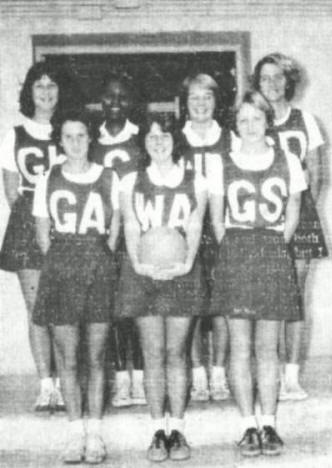 |
NETBALL
'A' TEAM
The 'A' Team this season played extremely
well, even though there was a lack of players. Our two
shooters, April Morris and Debbie Canham, also played very
well, and their shooting was of a very high standard.
The team as a whole managed to come second in the league,
and when the knockout matches were played we came first,
which pleased the team no end.
Team members being:-
Nicky Shipp GD
Belinda Young WD
Kim Hanns GK
Angie Griffith C
Debbie Canham GA
April Morris GS
Pat Fairclough WA
NICKY SHIPP
|
|
NETBALL 'B' TEAM
Back Row: J. Stace, J. Hills, S. Woods, H. Hipperson.
Front Row: L, Oliver, C. Church, S. Burns.
INTER SCHOOLS JUNIOR NETBALL TOURNAMENT
The inter-schools Junior Netball Tournament took place this
year on Saturday, 6th May. There were ten teams competing in
all two from each of the Junior Schools: St Andrews and
Luqa, and two from each of the Tal Handaq Houses: .Alanbrooke,
Cunningham and Tedder. Because the reduction in numbers, in
all the schools taking part, this was a noticeable uneveness
in size - - third year Primary children in some cases
competing against second year Secondary, but a high standard
of netball was reached, and all teams thoroughly enjoyed the
morning's play.
'A' TEAMS
'B' TEAMS
Tedder
8 pts
Cunningham 6
Alanbrook ..., 5 pts
Luqa
4
Cunningham. 4 pts
Tedder
4
St. Andrews . .3 pts
St. Andrews 4
Luqa
0 pts
Alanbrooke 2
Capt. and Mrs. Law presented the cups to the two winning
teams, and a further cup was presented to St. Andrei as the
primary school achieving the highest number of poll overall.
|
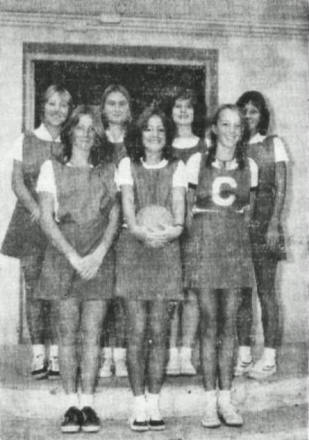 |
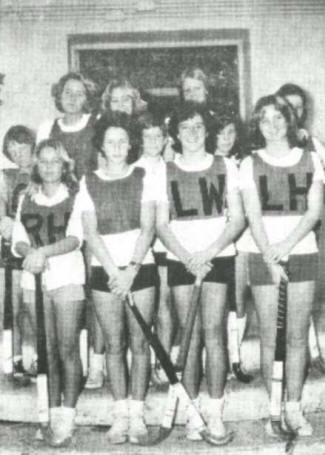 |
GIRLS HOCKEY TEAM
N. Shipp, E. Dryden, A. Morris, L. Brewis, L. Dryden, D.
Canham, D. Dawson, S. McKee, Y. Bennett B. Fogarty, G.
Evans.
BADMINTON CHAMPIONSHIP
Between the dates of 11 and 18 March 1978, the Maltese
National Junior Badminton Championships were held.
Tal Handaq were represented by 8 of its members.
U-13. All the members of Tal Handaq who entered this past of
the competition were drawn in the top section. This meant
that only one person could get through to the final. Mark
Judd was beaten by Mark Bennett 21-11, and Christopher
Bennett narrowly lost 23-22. Mark Bennett went on to the
final getting in by in the semi finals. He won the final
beating G. Schembri 15-5, 15-2.
U-15. 6 persons entered this competition: J. Turner, R.
Brierly, D. Dove, M. Fegan, T. Woods and M. Bennett.
M. Egan got through to the final, knocking out R. Brierly on
the way. Mark Bennett got through to the final after having
a very hard game in the semi-final. M. Egan beat M. Bennett
in the final 13-2, 15-7.
In the U-18 competition Matthew Lane got through to the semi
final then lost to the eventual winner G. Grech.
MARK BENNETT
|
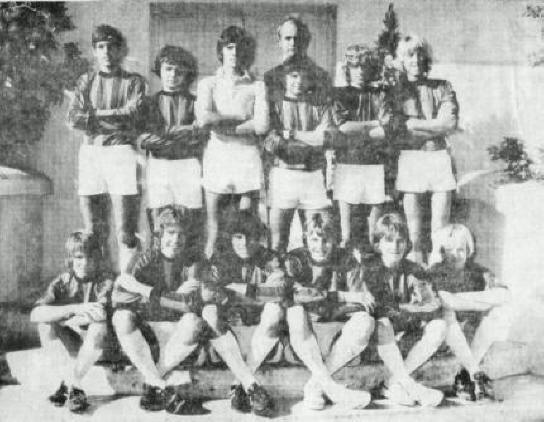
Back Row: A. Madge, M. Egan, A. Basson, Mr. Newton, Da
Silva, M. Morris, S. Oliver.
Front Bow: G. Smythe, D. Bonner, S. McKee, J. Russell,
Lambert, S. Morris.
|
1ST XI SOCCER
Season 1977-78, the last season for Tal-Handaq Soccer, was a
very good one which saw the team challenging for honours.
During the league season many fine results were obtained
(including a 2-0 defeat of Overseas) and a comfortable place
in the League Table reached. In the League Cup only a close
2-1 defeat by H.M.S. St. Angelo prevented the team reaching
the final. But perhaps the highlight of the season was the
match against the Malta XI played at Marsa Stadium in front
of a large crowd. After a superb match the school lost the
game but won many admirers for their skill and
sportsmanship.
The team was well led by Derek Bonnar, a gifted
knowledgeable player, who efficiently organised the
mid-field boiler room. Alongside in mid-field were the
ubiquitous Steve Oliver, always a gritty competitor and Tim
Lambert, who worked hard on the left side.
But all teams need to defend and this year we had a sound
and efficient unit to cope in this department.
Jon Kitchen, in goal, was agreeably the best Tal-Handaq
keeper for several seasons. His handling and occasionally
breath-taking saves were an inspiration to his colleagues.
At right back Martin Egan played consistently well with his
accurate chip passes often initiating attacks. At left back
Tony "Rocky" Da Silva was powerful and reliable. Matthew
Lane did well at stopper using his strength and experience
to good effect. The defence was well generalled by Stuart
McKee who was always sound and often brilliant as "libero".
In attack Mike Morris was used as an old-fashioned right
winder and did well since his speed, crossing-ability and
shooting could be used to maximum advantage. John Russell
and Andy Basson were prolific goal-scorers with their speed,
flair and penetration often causing havoc to opposition
defences.
|
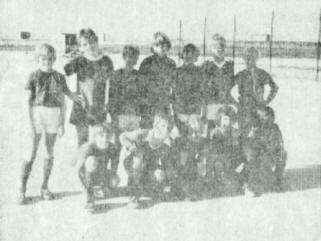
The Winning Tedder Team in the Minor Soccer League.
.
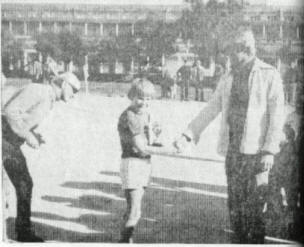
Michael Walker of Tedder receives the cup from Mr.
Ricketts,,
on behalf of the Winning Team in the Minor Soccer League
|
All the above players in playing regularly enjoyed soccer
and merited the kudos but teams need more than eleven
players and this year was no exception. Steve Dove did well
when required to play in goal but special mention must be
made of Sean Morris who filled in as required when injuries
struck and was a reliable substitute when the full team was
available. Statistics:
P W
L D
F A
21 9 9
3 59
64
Leading goalscorers: A. Basson 14; D. Bonnar 12; Russell 12;
M. Morris 5; S. Oliver 3.
Full colours awarded: D. Bonnar, A. Basson, M. La| S. McKee,
S. Oliver, J. Russell.
Half colours: M. Egan, A. Da Silva, T. Lambert, J. Kitchen,
M. Morris, A. Madge, G. Smythe.
RUGBY 1977-88
Results:
Lost to St. Edward 10-6 Won 7's Interservices Knockout Plate
The goal potential of this year's Rugby XI remains
unrealised mainly due to a lack of fixtures. However the
school seven fighting against the odds showed that skill
still counts far more than muscle and managed to defeat the
RAF 'B' team. 24-4 to take the Interservices Knockout Plate.
A short but still comparatively successful season.
D. BONNAR
|
ORIENTEERING
This year's competition took place on Saturday 28th January.
The competition was held west of Rabat, starting at Fiddien
Bridge and ending two miles up the road at Bahrija. The
teams finishing with over a 100 points would have covered
approximately 10 miles.
Each year let off at different intervals of 2 minutes. All
teams had 1 hour to complete the course visiting as many
checkpoints as they could. For every minute over the given
time, 1 penalty point was deducted.
A special mention goes to S. Dove and M. Morris (A) 5th
year, D. Bonnar and A. Basson (A) 6th year, and S.Mckee and
P. Groves (C) 5th year, who achieved more than
100 points. The top girls' team were D. Canham and H.
Hipperson (A) 5th year who scored 38 points.
Final Score
Score Penalties Total points House points
Alanbrooke
770 147
623
46
Cunningham
765 287
478
42
Tedder
535 115
420
39
Individual team with most points:
S. Dove 5th year
M. Morris - 5th year
1st year C. Hodgson T, McConnell l36
(Alanbrooke)
2nd year M. Judd M. Bennett
65 (Alanbrooke)
S. Grant R. Christie
65 (Cunningham)
3rd year P. Basson S. Brewer
74 (Cunningham)
4th year M Keating S Fairclough
84 (Cunningham)
5th year S. Dove M Morris
116 (Alanbrooke)
6th year A. Basson D. Borinar
110 (Alanbrooke)
Highest scoring girl's team: D. Canham, M. Hipperson 58
points (A).
Many thanks to the organisers.
A. BASSON 6C
|
TAL-HANDAQ MALTA A.A.A. NATIONAL CHAMPIONSHIP REPORT
This year the Championship was held on the track at RAF Luqa.
This track is not the best but we are very grateful for the
use of it.
The opposition proved very strong and due to our
deterioration in numbers, we could not cover every sport
strongly.
In the Youths we received three firsts; K. Stephenson (now
left) in the 400m with a time of 58.9 seconds, M. Keating in
the 1500m with a time of 5.01 minutes and finally the 4 x
100m relay team whose time was 52.3 seconds.
The Juniors and Seniors did not have as many firsts with
only Andrew Basson in the Javelin with a distance of 41.77m
and Anthony Da Silva in the Shot with a distance of 9.51m
receiving a Gold.
But do not let these results tell the story as we proved to
be a formidable problem taking many second and thirds
placings in a classical challenge with the local schools.
STUART McKEE
|
TAL-HANDAQ BOYS HOCKEY 1977-78
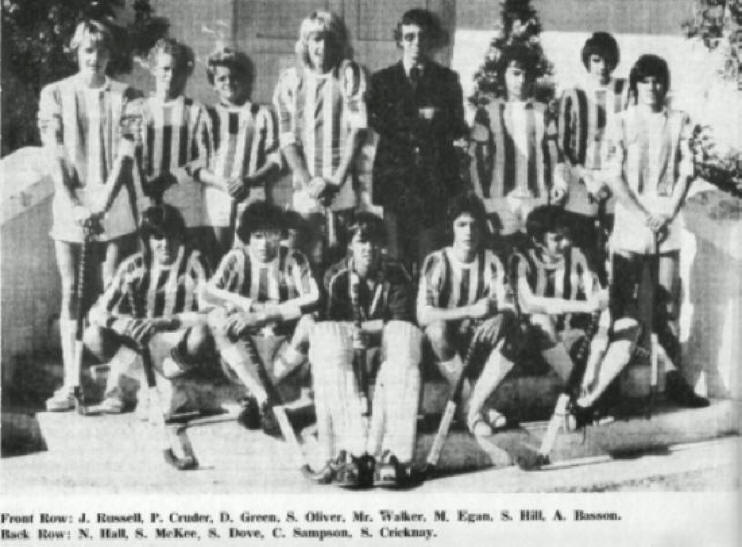
| Despite the decision of the Malta Hockey
Association not to run an U18 League this season (which
Tal-Handaq were favourites to win), more hockey has been
played at more levels than in any previous year.
1st XI U18
After two convincing victories over De La Salle (2-0 and
4-3) in early season friendlies, the 1st XI found itself
without regular opponents. Two keenly contested matches
against Overesas resulted in a narrow 0-1 defeat and a 1-1
draw. The U18 Six-a-Side team has had an outstanding
successful season. In the Luxol Cup competing against the
best adult Maltese and Services sides, the school failed to
reach the quarter finals but went on to win the Plate for
the best non-qualifying team. The season's zenith was
reached on Sunday May 7th when Tal-Handaq 'A' won the Malta
U18 Six-a-Side Championship beating arch-rivals De La Salle
in the final. At the time of writing, Tal-Handaq 'A' and 'B'
teams have entered the Inter-Services Six-a-Side
competition, to be held on Saturday May 13th, in which the
'A' team is again expected to do well.
Tal-Handaq boys have also made a sterling contribution lo
the Overseas Hockey team in the Inter-Services competition
and in friendly .matches against local sides and visiting
ships.
S. Oliver, A. Basson, S. Hill and M. Egan have been regular
stalwarts of the side, and J. Russell has made a more recent
but nonetheless valuable contribution.
|
1st XI Squad
S. Oliver (Capt), A. Basson (vice-capt.), S. Crickmay, P.
Davison, S. Dove, M. Egan, N. Hall, S. Hill, J. Kitchen, S.
McKee, S. Morris, M. Petrie. C. Sampson.
Inter House Competition
Again for the first time, a Boys' Inter-House hockey
competition was held during the Spring Term. Although it was
mainly intended to give the regular hockey players more
competitive games at a time when the Malta Junior League was
experiencing a hiatus, it also introduced the game to S3ms
boys who, despite their sporting talents, had previously
shunned the curved stick. Their evident enjoyment - - and
their technical improvement as they became more familiar
with the rules testified to the value of the experiment.
Tedder were the worthy victors, after Cunningham
unexpectedly defeated favourites Alanbrooke in the last
match.
Although it is always invidious to single out individuals, I
feel that Steve Oliver deserves special mention in this
(regrettably final) hockey report. AS captain of the 1st XI,
Tedder Hockey captain, and leading goal-scorer for the
Overseas Club, he has shown qualities of sportsmanship
allied to skill and determination which have earned him the
respect of many of the senior hockey players in Malta. This
in no way demeans the contribution of all the others who
have, by their efforts over two or even three seasons in
some cases, made Tal-Handaq probably the best school hockey
team on the island this year.
D.J. WALKER
|
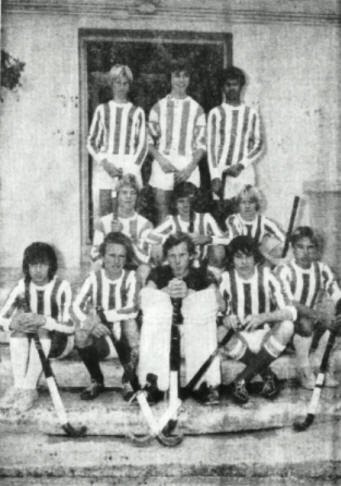 |
U16XI
The strength in depth of Tal-Handaq boys' hockey this season
was shown by the fact that for the first time we were able
to field a 2nd XI. This team began as a Fourth Year L XI and
as such gained four consecutive victories over a Naxxar
Secondary U16 XI. When the Malta Hockey Association decided
at length to replace the U18 League by an U16 League, the
Tal-Handaq U15 XI was strengthened by the addition of the
younger members of the 1st XI for the purpose of this
competition. Unfortunately this meant that some U15 players
were deprived of competitive hockey. The U16 League after
some dislocation, is now functioning more satisfactorily.
Tal-Handaq lost narrowly to De La Salle 0-1 in the opening
match, but overwhelmed Grejmpads, 4-0, in the second
fixture. The third and decisive league match against Qormi|
remains to be played at the time of writing. A victory would
mean entry into the semi-finals of the competition.
U16 Squad
S. McKee (capt.), S. Hill (vice-capt.), S, Beckett, P
Davison, D. Dove, M. Egan, J. Kitchen, S. Morris, M. Petrie,
L. Roy, C. Sampson, S. Tinker, S. Triffitt, J. Turner, S.
Whitehead.
|
| TAL-HANDAQ CROSS-COUNTRY CHAMPIONSHIP
1978
This year the school Cross-Country Championship got off to a
fine start!
The Juniors, as usual, started the occasion with a fine run
from S. Jones, of Cunningham, coming in first with a time of
15 minutes and 55 seconds. Second came M Bennett of
Alanbrooke and third I. Shipp of Cunningham. The results of
the Juniors were:
Alanbrooke with 40 points, Cunningham with 48 and Tedder
with 90 points.
In the Colts Mike Keating set the pace coming in first with
a time of 15 minutes and 23 seconds for Cunningham Second
came M. Petre for Alanbrooke and third D Doc for Tedder.
The points awarded were Cunningham with 41 points, Tedder 54
and Alanbrooke with 76.
The final positions lay on the results of the Seniors Steve
Oliver, of Tedder managed to overrun the ever powerful Derek
Bonnan of Alanbrooke with a time of 25 minutes and 56
seconds. Phil Groves came third having an excellent run
against great odds.
The points for the Seniors were Alanbrooke with 36 points,
Cunningham with 68 and Tedder with 75.
This make the final positions: 1st Alanbrooke 152 points
2nd Cunningham 157 points
3rd Tedder
219 points
STUART McKEE
|
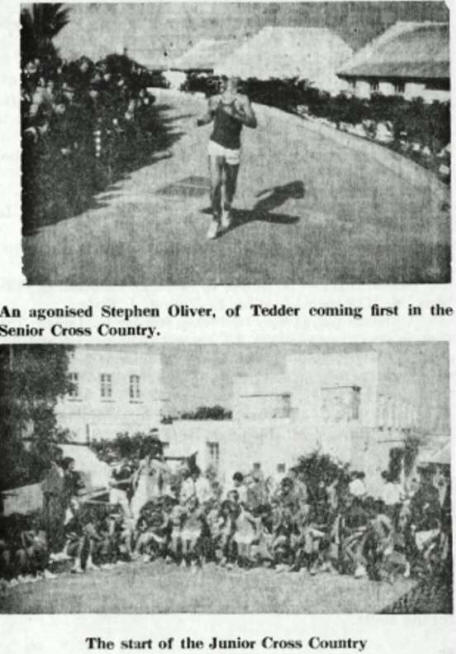 |
| |
|
HOUSE REPORTS
|
ALANBROOKE GIRLS
Again this year Alanbrooke has had a very successful
sporting season. Both last year's Swimming Gala and Sports
Day were won by Alanbrooke.
At the beginning of the Autumn season the Netball began,
with Alanbrooke coming first overall.
The teams consisted of the following:
Junior Team F. Draper, J. Burslem, L. Parry, L. Raynor, A.
Gibson, V. Barkby.
Intermediate Team M. Proven, D. Jenkins, Y. Gayle, J.
Keating, L. Brewis, S. Bums, D. Ramsay.
Senior Team N. Shipp, C. Stace, D. Canham, D. Gibbons, H.
Hipperson, J. Hills, B. Young, J. Stace.
All teams played very well when it came to Hockey. The
Seniors won their matches 3-1 against Cunningham and 8-0
against Tedder. Both the Juniors and Intermediates played
very well in their matches. The teams consisted of the
following:
Junior Team V. Barkley, A. Gibson, A. Boissevain, F.
Draper, L. Raynor, M. Hitchings, K. O'Malley, S. Holman, L.
Hart, R. Brown.
Intermediate Team J. Keating, L. Latham, D. Ramsay, G.
Evans, D. Jenkins, L. Dryden, D. Paul, L. Hastings, L.
Brewis, A. Stapley, Y. Gayle.
Senior Team N. Shipp, D. Gibbons, L. Brewis, S. Stace, J.
Hills, H. Hipperson, D. Canham, D. Hipperson, C. Spanton, S.
Carpenter.
For the third time running Alanbrooke managed to win the
Orienteering Competition. This was a very pleasing result
for the house.
The housepoints for Alanbrooke are looking good at the
moment and hopefully we should regain the cup, but knows
what will happen between now and the end of term.
Lastly we would like to thank all members of Alanbrooke for
their consistent effort throughout the year. The house would
also like to thank Miss Rae for all the hard work has put in
since taking over from Mrs. Parry Jones Thank you.
NICKY SHIPP Games Captain HEIDI HIPPERSON House
Captain
|
ALANBROOKE BOYS 1977-78
Yet another successful year for Alanbrooke boys.! summer of
1977 saw a clean sweep of the available sport and academic
trophies. The all round power of the senior part of the
house enabled us to take the Cricket, Athletics, Swimming
and Champion House Trophies. In the Cricket Davies and Dave
North provided the class with both bat ball to ensure easy
victory. However, in the swimming athletics the final result
was in the balance until the last event where we obtained
the points to take the Trophy.
The start of the 77/78 school year saw the departure many
talented sportsmen. However the house marched on undaunted
to take the Soccer, Cross Country, Orienteering and
Six-a-Side Soccer Trophies.
In the Soccer it was the senior side with 6 of the self 1st
XI that showed the younger members of the house way to
victory. The junior and colt sides failed to emulate the
seniors but still managed to gather enough points to give
House overall success. Special mention must go to Bennett
and Judd in the juniors, as well as Basson, Kitchen, Da
Silva, Russell and Morris all of whom performed admirably.
The basketball season was not as successful as it could have
been but we still managed to secure second place. Here too
the senior side came away with a 100% record but due to a
less impressive play by the colts the final positions saw
Alanbrooke trailing by 2 points.
The cross country championships saw Alanbrooke at its superb
best. In the juniors fine runs by Bennett, Winchester and
Triffitt saw the house come away with an 8 pt lead. The
colts didn't do so well but Petrie ran a fine race to gain
2nd place. The seniors put in what can only be described as
an amazing performance the first 6 of the Alanbrooke team
all came in the first 10 placings. These fine efforts were
duly awarded by the cross country championship Trophy.
The Orienteering competition again saw the house in fine
form with the 1st place in each age group being taken by an
Alanbrooke pair. It should be noted that this is very much a
team event a second performance by the rest of the house
ensured victory once again. Special thanks to Mr. Winn for
masterminding our success.
With the talent present in the senior hockey side victory
looked like another forgone conclusion. However a collapse
in the second round saw the team fall into second place.
Perhaps this result will show that petulance and bad
sportsmanship win neither trophies nor friends,
Eventually we were able to get the opposition back onto
the soccer field and after an enjoyable competition we
emerged as six-a-side champions. This was a closely run
affair as at the beginning of the final round any of the
Houses could have won.
On the whole a good year for the house unless there are
any surprises we should again take the championship trophy.
Thanks must go to Mr. Newton for all the hard work and
support he has put in through the whole year.
D. BONNAK
Note from Mr. Newton:
Derek Bonnar has modestly omitted to mention himself in the
Sports comments but his contribution to Alanbrooke Sport has
been remarkable. An excellent soccer player, fine athlete,
brilliant basketball player - - but a duffer on the hockey
field - - he has been an inspiration to the younger members
of the house.
M.J. NEWTON
|
CUNNINGHAM GIRLS
Many thanks must go to all girls who took part in sports
this year. With the great reduction in numbers, there have
been some difficulties in gathering together full teams for
all the various events.
Well done to all those who faithfully turned out to
practices, and to those who helped out to make up the teams.
There have not been resounding success in sports this year,
though everyone has been very keen and tried hard. In
netball, all the teams were enthusiastic, but only the
Junior Team managed to carry off a cup. In the inter-schools
Junior Netball Tournament Cunningham 'B' Team was
victorious.
In Hockey too, the Juniors beat all their opponents, though
the Intermediates and Seniors played very good games, but
were unfortunately beaten by the opposition.
We hope that our results will be better in the next two
major sporting events of the year the Athletics
Championship and the Swimming Sports. It would please
everyone in Cunningham if the House could win these in this
the last year of the school's life.
At the beginning of the year, Cunningham was ably led by Pat
Fairclough, who was also responsible for the games.
Unfortunately Pat left at the end of the Spring Term and her
place was taken by Sue Hewitt as House Captain and Lindy
Oliver as Games Captain.
Good luck to everyone in Cunningham House and best wishes
for the future.
S. HEWITT (House Captain)
QUICKWAYS
PACKING & REMOVAL SERVICES
ANGELO
BORG & SONS
CASA DEBORAH
UPPER ST. GEORGE'S
STREET,
GZIRA
(NEXT DOOR TO QUICKWAYS WAREHOUSE)
Telephone 31277 |
CUNNINGHAM BOYS Due to dwindling numbers, Cunningham
House has achieved the excellence that it had in past years.
How the enthusiasm, team spirit and certain skill is present
among the members of the House. As this will be the last
Cunnigham House report many thanks to those members of staff
affiliated with the House, namely Messrs Bonner, Walker,
Davey and Goss and Matthew Lane who held the post of Games
Gaptain so ably. Thanks also are due to all the members the
House from the 1st to 6th years for all the effort they put
in.
As usual soccer was the predominant interhouse sport In the
Seniors, Matthew Lane, Martin Egan and Stuart Mel were the
strongest members of our team, and they backed up very ably
by such players as Phil Groves, Sin Lane, Anthony Jackson,
Nick Hall, Simon Jackson, Sonmez Tinker and Stephen
Whitehead. They played well in all their games and came
second in the Senior Competition.
The Colts and Juniors played with characteristic
determination and enthusiasm and their squads were as
follows
Colts: Basson (Capt.), Lane, Brewer, Whitehead, Spencer,
Grant, Simpson, Jones, Shipp, Hall, Warner, Goodyear.
Juniors: Dawson (Capt.), Lane, Goodyear, Beresford,
Proctor, Warner, Salmon, Young, Ciantar, Campbell, Clements,
Preston.
Basketball is a sport few have mastered in Cunningham mainly
through lack of practise, yet we still achieved some worthy
results. The Seniors had a very close, fast paced game with
Tedder in which we lost in the last minutes of the The Colts
played well beating Alanbrooke but losing to Tedder.
The Cross-country this year was a very close event,
Alanbrooke just pipping Cunningham at the post by 5 points.
Special mention should go to Philip Groves who ran a
fine race, and to the excellent effort by the Colts and
Juniors who took 1st place in their sections.
The Orienteering Championship was another close event
between Cunningham and Alanbrooke, the latter just winning
by 4 points. The 2nd (Grand and Christie) 3rd (Basson and
Brewer) and 4th (M. Keating and Fairclough) all came first
in their respective years well done! Notable performances
were also made by S. McKee and P. Groves of the 5th and S.
Jackson and M. Lane of the 6th who came 2nd in their
respective years.
Our Hockey results were most disappointing in view of the
fact that on paper at least we appeared to have a very good
side. However, we did manage to win one of our matches and
prove strong opposition in the others.
In the Athletics we were well beaten into third place,
although it should be pointed out that on the clay our
results were at least comparable to the other houses and our
low placing was due to a poor total of pre-event standard
points. Particularly good results were obtained by:
Andrew Lane (1st year) a school record of 2 min. 45 sec.
obtained in the 800m. and also winner of the Triple Jump.
Stuart McKee winner of the Senior 200m, 400m. and Long
Jump in which he equalled the school record.
Stephen Brewer and Phil Basson in the 2nd/3rd year group
winners of the 1500m. and 800m. races respectively.
SIMON JACKSON House Captain
|
|
TEDDER GIRLS
The past year has been one to remember, and although the
numbers in school are falling rapidly our performance has
not fallen at all. Even the house members who don't usually
take part in sporting activities have helped make up numbers
where needed.
Once again we have excelled in our lower school matches. The
Junior team won every game, as did the 1st years who carried
off the 'A' Team trophy in the Inter-schools Tournament. Our
Intermediate team also played very well and won one trophy
during the session. Our Seniors came second to Alanbrooke
after a hard fight for first place.
On the hockey field our last year's strong Junior team
became an unbeatable Intermediate Team and won both
trophies. It may seem unfair to single out individuals, but
I am sure the whole house would join me in congratulating
and thanking Sandra McKee and Dawn Dawson who have supported
the house so loyally and ably for three years and who have
formed the nucleus of an enthusiastic and talented team.
Well done, everyone.
Although we didn't win the orienteering our house's spirit
didn't wear for a minute. Even the first years seemed to
have amazing fighting spirit. So on the sporting scene
Tedder seems to have done well, but we seem to have come out
top on the academic side. At the moment we are winning on
the credit count, and if we manage to sustain this lead at
the end, then Tedder will receive the last House Point
Trophy that Tal-Handaq will award.
I now hope that we will do as well in the forthcoming
Swimming and Athletics competitions, as I'm sure 'we will.
Finally, I am sure that the House would like to join Miss
Ash and I in thanking the members of the staff in Tedder,
and our Games Captain, April Morris, for all their hard work
and support throughout the year, and everyone who has made
this final year at Tal-Handaq such a memorable one. I would
also like to take this opportunity of wishing all House
members the best of luck in their new schools and careers
KIM HANNS House Captain
|
TEDDER BOYS REPORT
The sporting side of Tedder House has been subject to a
dramatic fall in the numbers of athletes due to the rundown
of forces in Malta. As a result, those remaining athletes
have done far more in the way of sport than normal. However,
Tedder has managed to produce reasonable standards of
sportsmanship, throughout the school year. In fact, Tedder
has managed to beat the opposing houses, Cunningham and
Alanbrooke, in basketball and hockey, Alanbrooke being firm
favourites in both events.
At this point I would like to thank all those who took part
in events, for their effort and support throughout the year.
I would also like to thank on behalf of Tedder House Mr.
Lewington and Mr. Casely for coaching and organising the
house.
S. OLIVER Games Captain
The beginning of the 1977-78 school year saw the raising of
the cloud of apathy that had descended on Tedder boys due to
the leaving of their previous House Master. This mood was
soon lifted by the drive and determination of the new House
Master, Mr. Lewington.
New activities were encouraged within Tedder House, one of
which was Table Tennis, the final being between Chris
Rodgers and Raymond Cassar.
Mr. Lewington, along with other Masters including Mr.
Caseley, have sharpened up the sporting skills of the Tedder
boys and have turned them into formidable opponents of both
Cunningham and Alanbrooke. These sporting skills which have
been moulded to the boys' characters will stand them in good
stead for the future years.
With the gentle persuasion of House Masters, Tedder boys set
out in the academic field of the school to gain many House
points as possible. This resulted in Tedder House being top
of the House Points Competition. This interest House Points
brought about the House Point Certificate was pioneered by
Ian Rowbottom and Simon Crickmay.Already 35 House Points
Certificates have been awarded. certificates may only be
gained by boys who have awarded 5 credits in a half-term.
T. Groves is leading the House Point race; he has but is
closely followed by E. Bradshaw with 36; both of these boys
also have the highest number of credits gained in week; they
both have 8.
So now let us hope that this drive and determination carries
on until the end of this fina year at Tal Handaq. If it
does, Tedder will be top at the end of the year.
We would like to finish off by thanking Mr. Lewington Mr.
Caseley, Lieutenant Commander Richards, Mr. Slide a Mr.
Holland for all the help they have given to Tedder this
term.
IAN ROWBOTTOM House Captain
SIMON CRICKMAY Vice House Captain
|
CREATIVE WORK
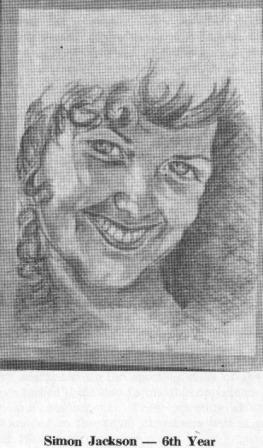 |
THE WAY OF WOMAN
Ah such raptures hold me fixed when by chance I
See that maiden fair tripping lightly by
Her figure so neat (she may well flaunt)
Her face set so well so nonchalant
But wait, those eyes of blue I sense mischief
Why I see she's dropped her silken hankerchief
What stroke of luck is this ? or was it plot
I'd rather fate played a part but I think not
I give it back, - - what fiendish vile is this ?
she smiles her thanks oh but what I'd give to steal a kiss
Then this sweet child trips serenely on
And I watch 'til she has almost gone
And another man appears in view
Ah see how he's fallen under her spell too
But wait why it is beyond belief
There falls again the silken hankerchief
Poor fool see how his heart is eager to obey
each self centred whim a woman's heart may lay
And now fair maid tease me not with looks of lust
For I see now and am filled with complete disgust.
SUE WOODS 5 J
|
DESOLATION OF A TREE
In youth she stood erect and slim
and never knew a lonely hour,
fresh and sweet her blossomed limb,
radiant in her shady bower.
To her each troubled little child,
would go when laughter found no place
and filled with love she'd gently smile
'til glee lit up each tiny face.
But with age the little children gone
and she not slim but wild and free
but not so free for one steel bond
a chain of love and memory
With thoughts of laughter gone before
she sighs a lost and lonely breath
and knowing now there is no more
accepts the solitude of death.
Michele Norton 5th Year
SPIDER POEM HIT OR MISS
Pay
Counting bullets,
Lift gun,
Load.
Wait for the target,
Bang!
Bang! Hit or miss?
Prize!
ANDREW LAING 2C
|
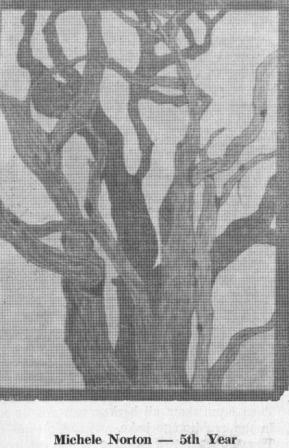 |
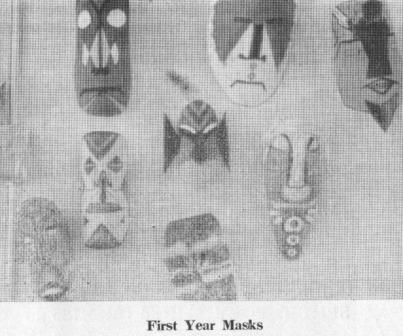
WITCH'S ENCHANTMENT
I threw into the cauldron
All big and round
A juicy toad which I had found.
A leg of a horse,
The head of a bat
A horse's tail, how about that!
I mix them all around
And spin them all over
|
THE WITCHES CHANT
We met at dawn,
On Mayberry hill,
The sun was just rising,
Away went the chill,
The cauldron was warm,
Ready for use,
Too, were the ingredients ready,
A head of a cow, a leg of a moose,
A plant off the ground, nicknamed
Mayberry thistle,
A heart from a rat, a leg of a dog,
Wool from a sheep, a piece of thistle
Two grey geese and a head of a squirrel,
An earn of corn, a piece of pork,
A lump of cheese and a lump of cork.
Around we go. "tiddly ho,"
And "WHOOSH" we disappear.
CAROL HODGSON IB
Then turn
them all out
And cover with clover.
I roll up in mud and dip in the stream
Then wash my claws .
So that they are clean
Then I put them all back
In the cauldron to bake.
Then hope they're all done
For hallowe'en's sake.
LESLEY JACKSON IB
|
THE ART COMPETITION
I was very busy the day I came home for half term after
going to Safi that night. I had already planned to paint a
picture for the art competition, a picture of an old Maltese
lighthouse or tower which was used in the Second World War
for sending light .signals across the island from one to
another.
I was going to paint it in an oil-based water paint. I
started it on the first Saturday of half term.
The most difficult time was the most important, lugging it
to school because it was still wet. So holding it with
tissue paper I just managed. In the end I won the prize for
the best painting.
STUART WARNER 1C
CAROUSEL
Wooden Horses
.Painted Bright
Pay your money
Rings the bell
"Climb aboard the
Carousel''
Faster Faster Round the ground
Spinning far
Above the ground
Then the driver
Gives a yell
"All aboard the
Carousel"
KERRY OLIVER 2C
THE SEED OF
LIFE
The seed of life
Once planted will go on for ever
Whether it be a human seed
Planted in a moment of tender passion-
Or whether it be a flower seed
Planted in a moment of simple delight
This concept is easy to understand
But not so easy to believe
Faith is the first step towards this belief
And belief is this faith.
ANONYMOUS 5th FORM
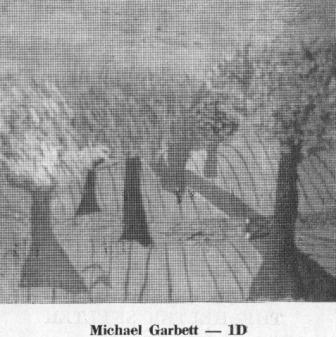
|
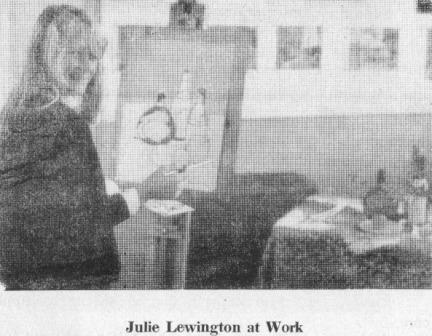
THE
HELTER SKELTER
Pay the money
Up we go
Right to the top
Far as we go
Sit on the mat
Hold very tight
Now we are off, for
The magical flight.
Sliding so fast
As we go round
But all too soon we're
Back
on the ground
TRACY GLENN 2D
TREEMENDOUS! !
"Shut up. Maple! Who are
you trying to cone?"
"Leaf me alone I'm twigging onto a new idea for the
laboratree."
'Stop barking about it and leaf it for the special branch,
the police are completely stumped, although they thought
that they wood get to the root of things."
"Oh, get knotted!"
"We're up to the elmbows in this case so stop branching off
the subject. I wood have thought yew knew better "
"Oak-ay, let me finish my apple. It's pure treeson, yew
know."
"Sorry. Willow yew come to the beech with me this
afternoon?"
"Oak-ay Ivy," said Maple as she birched up her apple core.
"Make sure you've got the treebor mints and don't forget to
larch the door as you are the elder of us," she said as I
she put on her trunks.
"Stop brambling on. If we work fast, they won't cactus.
Ouch!" she said. "I've got acorn on my foot."
"Before we go, don't forget to bring the catkins in
Look out! That dogwood get our catkins!"
"I'm getting spruced up for the beech because we might I
meet General Sherman on the plane he's quite poplar, yew
know. He uses Alberta Balsa shampoo."
"Sorry. On second thoughts, I'll go to the woods. By the|
way, are yew English Maple?"
"No, I'm Irish Ivy."
ELMNONYMOUS 5J
|
AUTUMN
Autumn is the time when
Squirrels gather nuts,
For when hibernating time is over.
Leaves fall off trees
With colours of red,
Orange and gold,
And crackle when they are trodden on
Autumn is when crops are gathered in.
Days get shorter,
Nights get colder.
JACQUELINE EDWARDS 2D
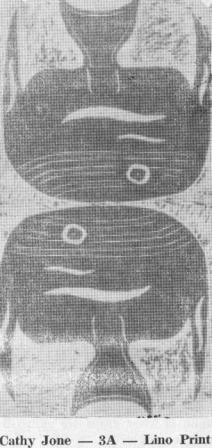 |
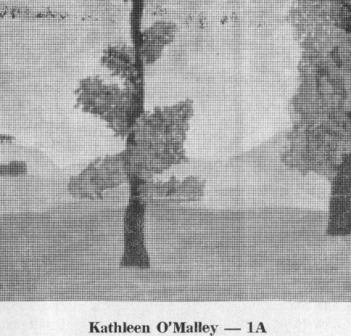
MY DOG BEN
I have a dog whose name is Ben. No dog is more playful than
he He means to me much more than a friend I'm glad he
belongs to me.
His coat is soft and always shines, His eyes are as clear as
glass, He barks but very rarely whines And what a waggly
tail he has.
But like all the other dogs in town, He has his mischievous
features, Like knocking dear old ladies down And biting legs
of teachers.
He leads the younger dogs astray With dire and downward paw
And tells them nasty things to say They never knew before.
Hut when he wants some food to eat He turns all kind and
good He makes his eyes lok large and sweet Bat it's only to
get his food.
In general he's quite good you know. Though naughty he seems
to be He can be polite when he holds out his paw And while I
shake it he winks at me.
TRUDY CURTIS 2A
|
CARGOES
(with apologies to John Masefield)
Colourful Viking ships from Sweden, Rowing through the North
Sea,
With a cargo of slaves,
goats, horses, Cows, sheep and unwilling company.
MICHELLE HIPPERSON IB
A dirty dull Drifter coming from fishing grounds Moving
through the North Sea, chugging all the way
With a cargo of Herring
Hallibut and Haddock Washed, cleaned and filleted by the end
of the day.
CARL HASTINGS IB
Beautifully coloured Gondola coming down from Venice Punting
down the river near the Palace Vera
Carrying tourists,
Parents, Children, And earning brightly coloured lira.
CAROL HODGSON IB
The trawler comes from distant lands, Dipping slowly through
the water so cold,
With a cargo of haddock
And pikes and eels Cod and fishing nets all stored in the
hold.
CHRIS BENNETT IB
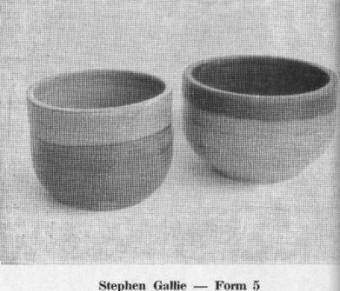 |
MUSICAL MARTIAN
Name: Walmo Lanelic. Occupation: Space Ship Operator.
Mission: To find a talent from Tal-Handaq a creation of
happiness which makes people shiver and shake 10 the rhythm
caused by modulation of sound waves transmitted through the
air.
As you can see, I had an assignment to discover this certain
unknown Talent Room Tal-Handaq.
On the twenty-second of the second, nineteen seventy-seven,
I orbited earth the round wooden ball of life, or so we
called it and headed for the centre of the Mediterranean
Sea. Soon we sighted our positive destination, the limestone
rock of Malta, on which stands a school, on which the talent
lies.
Our landing arrangements its site and my invisible
equipment -- had all been previously prepared 'Look out for
a group of white blocks, situated on a hill. Mind the
planes' were my instructions. Anyway, the landing went well,
a field it was littered with trees and a curious looking
pond or moat surrounding an island, but Was I in the right
place? Everything was so quiet and still, except a sparrow
thudding, as a hostile dark looking human, with a
handkerchief over his head, and a thick leather belt around
his waist, held an ancient looking fire-arm, with smoke
coming out the end.
All the green doors were closed, the yards empty. Was this
its disguise. I looked at my interstella nucular
chronometer, and adjusted it to local time to find out, by a
flick of a dial, that it was zero light fifteen, and with
that I heard a rumble, like a pack of elephants, coming from
up the hill. Down the school-yard came the green long
monster, tooting a horn a school bus? Yes. A lot of these
came, twenty in fact coming and going, leaving their
contents behind kids.
There was nothing wrong or strange with that, every-
thing was the same with us, just that our transport system
is more sophisticated and its development is on much
different lines!
After three hours of slogging in the heat, dodging kids with
bags, close investigation, bell ringing my search had
proved negative.
It was then, I decided to retire to my ship, but as I passed
Block Twenty-Eight I heard a strange but pleasant sound
drifting from inside the room. Did it sound like anything I
was searching for? I hesitated, yes, it was!
I crept up to the window and cautiously peered inside.
Inside I saw a group of men and kids sitting together in a
group, and were holding strange twisted and carved wooden
and metal objects. The metal, which was very shiny, was one
I was not familiar with, but appeared as if the sound was
made by air. All very strange but interesting. But even as I
watched this amazing sight, my blood quickened and I felt
like marching.
Littered around these people were black bags or cases of
some sort. Judging from the 'objects' and the cases they
seemed to fit together, I decided to examine more closely. I
then took out my 'sight' from my pocket and focused it on
the cases. There was writing on them. In large broad letters
it stated SCHOOL BAND. So this is what I have travelled two
hundred light years to find out.
This is the talent of Tal-Handaq which is the creation of
happiness
MARK HART 3A
|
| IMAGES School buses rumbling up the hill
Elephants on the march
Valletta on a Saturday morning The tuck shop at break
Soldiers in an army Desks in a classroom
A miser counting his money
A housemaster, counting the week's credits
A strong magnet A fire on a cold day
A drunk trying to walk straight
A right-handed person attempting to right with
A netball post
Someone tall with a large head
School bus rumbling up the hill My old grandad and his mates
A baby crying for food A never filled hole
An old man blowing his nose A slight earth tremor
|
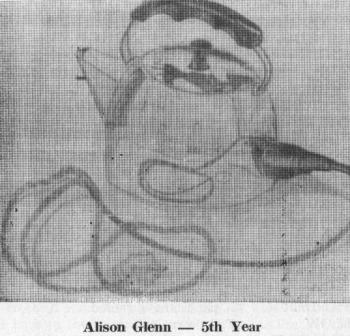 |
| PIGS
Large floppy ears
Big rubbery snouts
Small greedy eyes
Rippling rolling fat
Ever-eating mouth
Small arty tail
Horny little trotters
Great yellow fangs
Big- bloated belly
Short stocky stature
Short sharp bristles
Horrible smelling dung
Ring in his nose
Mark on his ear
Great big thighs of ham
Long side of bacon
Four short legs
Supporting a massive body
PIGS!
GEORGE BELL 2A
|
There was a young fellow from Malta,
Who thought he could swim to Gibraltar,
Then one day he tried.
But sadly he died,
And that was the end of poor Walter.
LOUISE QUINThere was a young rebel called Tom,
Who started fooling around with a bomb
They got most of him up,
With a teaspoon and cup,
And returned him by post.to his mom.
JULIE BURTENSHAW
|
DAFT DEFINITIONS
AMISS
ALAS
ATHSMA
BOMBARD
BANJO
BELFRY
BEATNIK
CARPET
CATACOMB
CATKIN
CANOPIES
DUMPLING
DEPRESS
DIGEST
DOLPHIN
EGO
EVENT
ENTREAT
EARWIG
EXPANDER
FALLOW
FUNDAMENTAL
GLADIATOR
GOODBYE
GRANARY
GRENADE
HUMPHREY
HOLLYHOCK
HERON
INVEST
JUPITER
KIDNAP |
Unmarried Lady
Scottish Girl
What a father says to his son
I.R.A. Poet
Forbid Joe to do it again
A bell which is free of charge
A groovy police station
Pet that lives inside a car
What cats use to keep their fur tidy
Brother or relative of a cat
Tin of vegetables
A baby dump
The men from the local newspaper
The Joke
A skinny doll
A man leaving
Including T
Chickens tea party
Hairpiece for the ears
A panda that's retired
Fall down low
A Men telling his friends he had found a crazy
person
Satisfied cannibal
Bargain
Place for storing grandmas
A new kind of fizzy drink
Special breed of camel with three humps
Prickly wine
Expression meaning 'not bald'
Wearing a vest
Question asked by irate mother
Quick sleep taken by a baby goat |
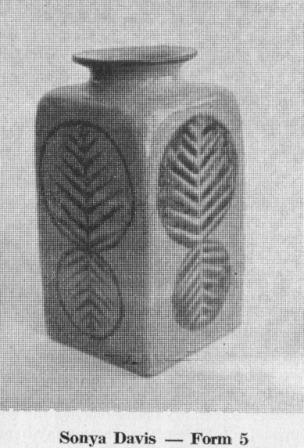
There was a young girl of New York
Who was Crazy on sweet and sour pork,
Until one sad day,
She got carried away,
As she accidentally swallowed the fork.
M. LEGGETH
|
LOLLIPOP
LUNATIC
LUNATIC
NORTHERN
MONEY
MELANCHOLY
MUSIC
NOBLE
OOZE
PARSLEY
QUICKSILVER
RUMINANT
RUFF
RAGAMUFFIN
ROLLERSKATE
SEAFRET
SILICONES
TRAPEZE
TYRANT
THAW
UNIVERSE
UNCANNY
UNDERBRED
VERMICELLI
VESTIBULE
WOOLLEN
WHOLESALE
X-RAYS
YAK
YEW
ZEBRA
ZINC
YEOMAN
YELLOW
ZULU
|
Rich father
Moon Bag
Clock on the moon
Urn which originally came from the North
Part of my leg
Man headed dog
A sick cow
A lonely cow
Question of ownership
Dada Toboggan
Money earned quickly
An ant addicted to rum
Sound made by dog with sore throat
A muffin made from rags
A fish on wheels
Worried waves
Ice cream for stupid people
Simple catch
Terrible female relative
A donkey with a cold
A poem with only one verse
Comes in a packet
Bakery in a cellar
Pasta made from worms
Underwear for male cow
Farmyard fowl made of yarn
A sale selling holes
Unidentified flat fish
Expression of distaste
Third person singular
French ladies' undergarment
Where the saucepans are washed
Man who plays with a yo-yo
To shout in pain
Public toilet in a zoo
|
FIRE
My family and I were sitting together shivering around a
fire and wrapped in deer and rabbit skins. Outside, the
fiercest storm known was lighting up the sky with great
flashes, followed by loud cracks. The gods were angry today!
Suddenly there was a blinding flash, much brighter than the
others. When our eyes were recovered from it, I looked out
of the cave mouth and saw a tree not very far away, had come
alive with a sort of yellow and orange, dancing flower. As I
watched, unable to speak for fright, I noticed that this
flower began to grow bigger. I began to get even more
frightened thinking that the 'flower' could be a monster
from the skies, maybe even a god sent to punish us for doing
something wrong.
My little brother began to cry, which made me feel a little
like crying myself (I didn't though). Then suddenly, the
dancing flower began to wilt and grew smaller. The rain was
killing it. The flower died altogether not very long
afterwards.
When the rain had stopped, I went out to look at the tree
where the flower had been. There I discovered the flower's
food. Trees. It was all black and dusty. If it can do that
to a tree, I hate to think what it could do to us. I'm
staying in during a storm for the rest of my life!
KAREN STANTON 2A
|
|
ESCAPE TO THE REAL LIFE
"When you say you're coming home at nine o'clock you do that
not ten hours later now get to your room!"
I stamped up the stairs in a bad temper, after all it wasn't
my fault because the party was supposed to have ended at
nine o'clock, but it was such an ace party that it became
better and better and just went on. It was still going
strong at the end when the cleaners appeared!
I wasn't ready for bed. I wanted to have a good time, sort
of show the world what life was... My God! I'm suppose to be
meeting the gang at ten for the film.
It's a good job mum thinks I'm going to see a film like the
'Jungle Book.' She'd kill me if she knew that instead I was
going to see something similar to the 'Exorcist!'
How am I going to get out of the house? It's hopeless. Mum
will be walking around the house and watching my door like a
hawk.
I jumped on my bed, picked up the Dandy and began to read
it. Desperate Dan was up to his tricks again, tying sheets
together and...wait a sec., what a fantastic idea.
I pushed the window up, after first locking the bedroom
door, and proceeded to pull the sheets off my bed. It's
lucky I'm only one floor up because my four sheets only just
touch the ground and I haven't tied them yet.
I changed into some Jeans, grabbed some money and before you
could shout, "Crackerjack," I was outside the window hanging
onto dear life with a sheet and a thin cotton one at that!
I had to make a little jump at the bottom, but I was soon on
my way to the bus stop. I arrived in town about fifteen
minutes later.
The gang were there, and as soon as they'd noticed me the
complaints came for being five minutes late - - if only they
knew what I'd been through.
The film started an hour later and so we walked around the
shops and went into a cafe for a coffee. The time passed
quickly and before long we were sitting in pitch-darkness
waiting for the film to start.
|
The film was quite good, but a bit far fetched the girls
either screamed with terror all the way through or covered
their faces up. It was now one o'clock.
I bought myself some hamburgers and we all decided it would
be good fun to have a knockout pool competition, at a cafe.
This went on until about five o'clock. We moved to the bus
stop and while we waited for a bus we talked about the party
the night before.
I was the only person to step on my bus and so I had aj seat
to myself. Mum's going to kill me when I get in. I bet I
she's worried stiff. The thoughts ran through my head and!
the nearer to home I got the more frightened I became!
I. was amazed to find my sheets still outside my window] as
I entered our garden. Surely someone must have noticed]
them. There again dad'll be still watching Grandstand and
Mum'll either be washing or cooking. Cor, I was starving.
I began to climb the wall step by step, it felt as if the
sheets were going to tear. My hands reached the window ledge
and as I gripped it something heavy sat on my hands. I
looked] up to find my sister sitting on my hands eating a
piece of creamy cake. "The bitch", I thought. I could
fall anytime and] as for that cake my mouth melted like ice
in the sun!
A little bargaining went on - - if she didn't let mum or dad
know I'd lend her my records and give her ten pence| every
week.
I was let in through the window. I smirked at her and
shouted, "What a sucker!" She clouted me and just as she!
screamed I placed my hand over her mouth, bent her arm back
and tortured her so she'd know what would happen if she
split one me.
I then went back to see mum, putting on the "all
sorry & innocent" act and apologised for being late in that
morning and if she didn't mind I would have something to
eat.
Her reply, "Well I'm glad to see you have realised what you
have done. Poor thing being kept in his room all day with no
one to talk to. There's some soup in the sauce-pan and Apple
pudding in the oven - help yourself. And with that I kissed
her!
JAMIE MERRIT 4K |
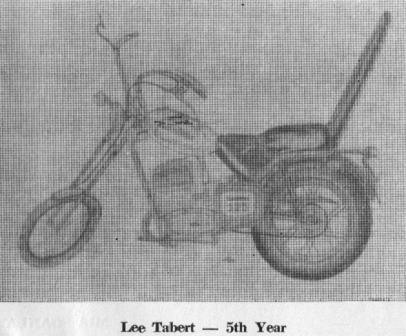
THE OLD TRAIN
The train is old
Its metal is rusty
Its funnel is dented And it smells all musty
Its windows are broken
Its boiler is fractured
Its wheels have seized
But its memories are raptured
Its coal bucket is empty
Its whistle is tarnished
It is covered in dust
And its wood is not varnished
Its outside is dirty It was built to last It was very good
But the past is the past.
GARY GREGORY
|
THE GHOST TRAIN
When I paid for the ghost train fare,
I struggled, should I go, do I dare?
I was brave and went in the train;
Then I felt something, was it rain?
I looked to my front, back and sides,
And decided never more to take one of these rides,
Because I saw horrible and strange looking creatures,
And also there were queer ghost pictures,
I was so afraid and frightened, I almost fell out of the
train.
In my loudest voice, I shouted: "Never again!"
The people looked at me and laughed;
"Who is that girl, who is being so daft?
The creatures, monsters and ghosts aren't real,
Don't worry, they won't have you for a meal!"
But I still wanted to get out of this place,
And then, as if I were in a race,
I ran out of this horrible ghost house.
ANNA BOISSEVAIN IB
There was an old lady called Jean,
Whose face was a shrivelled up bean,
She looked at the sky,
Which fell with a cry,
That ugly old lady called Jean.
HELEN WINTER-GOODWIN
|
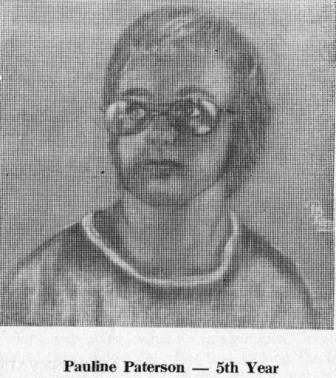 |
There was a young lad from Tal-Handaq
Who trudged round the isle with his ruck sack
He passed Victoria Lines
Ten thousand times
So they nick-named him Albert the hunchback.
GRAHAM LANE
There was a young woman from Malta ,
Whose brain was certainly a faulter,
While crossing the street
She was run down by feet,
Before the policeman could halt'er.
MIA SCANLAN |
|
NEWS OF FORMER PUPILS
( By Miss Yule)
This last issue of the School Magazine is a very sad
occasion for me as I joined the staff in September 1949 and
retired in July 1971, which means that my connection with
the school goes back for twenty eight years. I have remained
in Malta and have kept in close touch, not only with the
school, but with many old pupils and members of the staff,
so I now feel that I cannot let this last issue of the
Magazine go without news of the many ex-pupils and staff who
have called or written to me.
It is always sad when something good has to end but I am
sure that all of us who have had any connection with Tal
Handaq will cherish many happy memories.
Recently several ex-members of the staff have had holidays
here, among them Mr Roy Tatton who now lives at Tankerton,
near Canterbury. Mrs Dewstowe has had several holidays here;
she now lives at Cockermouth and teaches in an infant school
nearby. Miss June Herbert has recently spent a holiday with
Captain and Mrs Law, they were all on the staff together in
the late 1950s. She is now the Deputy Head of a big
Comprehensive school at Loughborough. Miss Dorothy Knight
was here this Easter and now teaches in a Hospital School in
Canterbury. Miss Pat Hunt who is now married to a Czech was
here on a visit from Australia where she and her husband
both work. Mr Eddie Mcallister expects to come here for
three weeks during the summer holidays this year.
From these visitors and letters I have had news of many
other ex-members of the staff Miss Chisholm is teaching
Biology at Newcastle, Mrs Reynard has emigrated to Australia
where she has a good post, Miss Janet Hunt (Signora Brando)
now lives in Verona where she has gained an Italian Degree
and is teaching there; she has two children.
When I was in England last summer I stayed with Mrs Vicky
Hitchcott who is Head of Geography at Millfield; |
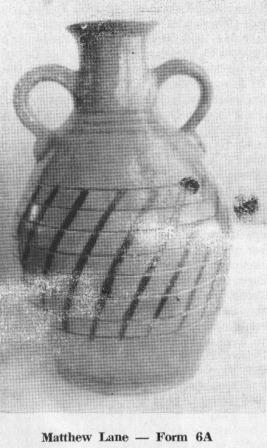 |
there are two other ex-members of our staff
teaching there Captain Broad is in charge of Mathematics
and Mr John Lowe, of the Art department, we all met and
exchanged news. I also spent a day with Commander and Mrs
Currie who live in Cornwall; he is Deputy Head of Liskeard
Grammar School.
Miss Bailey who was in charge of the Home Economics dept.
for a long time has been married to Mr Ernest Harris for
several years and lives in Malta in the same flat
overlooking the Grand Harbour. Miss Gweneth Reed is now
teaching at Arundel and lives at Bognor Regis. She often
meets Miss Bannister, now Mrs Green, who lives at Selsey,
she is teaching near. Incidentally she and her husband were
here for a holiday last August, they came to supper with
their delightful ten-year-old daughter.
Mr Andrew Gallacher is now working in an advisory capacity
in Iran, this is his second tour there and since he left Tal
Handaq he has worked in the Ivory Coast and Egypt. He has a
house in Glasgow, so is able to keep in touch with many ex
colleagues and pupils. Also living and working in Glasgow is
Miss Margaret Flanagan who has a post at a College of
Education there. She sent me news of Miss Matheson and Miss
Grant who both live over the border.
With a school such as Tal Handaq where some staff only had a
tour of three years it is difficult to keep track of their
movements but I am sure that they all look back on their
time here with nostalgia.
The same may be said of the pupils, it is clear from their
letters and visits that they consider the time spent here
with affection. Many of the boys who have joined the
Services have called at the school and it is sad that after
this year this link will be lost.
Roger Tatton is a Royal Naval Helicopter Pilot, he is now
seconded to the R.A.F. at West Brayton, he is married with
two children. Another member of the R.A.F. is Roger Wilkin;
|
his brother, Andrew, is a
lecturer at Stirling University. I get a Christmas card
every year from Rayner Brammall who is a W.E. Office in the
Navy. Commander Stubbs' notice in the Navy News was answered
by Nicholas Franks who is now a Lieutenant Commander on
H.M.S. Hermes, he was a pupil at the school in 1949/50 when
some of the junior classes had , not yet moved to Verdala.
Many ex-pupils are teaching. Bill Duncan is the music master
at Saltus Grammar School in Bermuda, a post which gives him
great satisfaction. Malcolm Chesney is the Deputy Head of a
Primary school in Birmingham; his sister, Elizabeth, is
teaching at Pickering in Yorkshire. Penny Tatton, now Mrs
Currie, is teaching in Brunei where her husband has a
government appointment with the fisheries Dept. Clare Garvey
trained as a teacher but is now working as a hotel
receptionist.
Susan Kitson did an art course and has now got a post as a
textile designer in London; she is married to Martin Lee.
Alexander Brown studied Music in Manchester and is now a
member of the English Opera Company.
Many pupils of the years 1961-65 have sent me news, Jane
Carver trained as a P.E. teacher, then got a commission in
the Wrens, she has now resigned and is a trainee as a
building society manager. One of her contempories, Maureen
Sillis, now Mrs, Bleakley, lives in Cornwall, she has a
little girl and seems to have plenty to occupy her. Patricia
Satchell is also! married, after taking a degree in
Chemistry at Southampton.
Jean Proctor who qualified in Physiotherapy is also married.
Melanie Lusty married Richard Sanders, an ex Tal Handaq boy,
he has a Commission in the R.A.F. and visited the school
fairly recently while on a 'flying' visit here. Rosemary
Andrews after spending several years in the hotel business
married about a year ago a Swiss banker and came to Malta
for her honeymoon. |
She gave me news of Paula Goodale,
now Mrs Gilbert, who lives at Old Amersham, also of Rosemary
Dearden who, after graduating in Geography, married a
colleague, they have collaborated in published a Geography
textbook. She is now Mrs Grenyer and lives in St Albans.
Angela Salter and Pamela Hinton both graduated and married
engineers and have spent a fair amount of time in the Middle
East where their husbands have had appointments.
More recent leavers are Linda and Brien Cottam; Linda is now
doing a degree course at Nottingham, she has decided to
specialize in knitted textiles. Brien is now at Price's
School (a sixth form college) where he is working for
Science A Levels. Linda has news of Sarah Harbour who is
making a career with W.H. Smith's -- also of Shannon Branch
who is at college in the States.
The Armstrong triplets who left in 1970 are now all doing
well, Mark gained a B.A. at Kent University, he is now in
Paris, working as a 'lecteur' at the same time studying for
an M.A.' Sean has a post in the City, while Patrick, having
done a course in Horticulture, has now won a place at Merrit
Wood Agricultural College.
Denise Flatt and Danuta Robinson called on me last summer,
Denise has now married Mario Agius and settled here; Danuta
is working as a secretary in England, she gave news of her
family, Johanna is in her final year at Birmingham College
of Education. Alec has gained a place at Salford University,
his heart condition has greatly improved.
I recently had a letter from the mother of Norman and Evelyn
Morgan, Norman is doing Post Graduate research at Liverpool
University, while Evelyn is teaching Domestic Science at
Swanage County School.
|
Earlier I mentioned that Commander Stubbs had received a
letter in answer to his notice in The Navy News, he also
heard from Jackie Frewins, now Mrs Sinnatt, whose chief
memories were of the bus ride up the lane in the heat of
summer with the overpowering stench from the tomato paste
factory permeating the air. Roger Emmit also wrote, he had
called during the summer holidays when a member of the staff
on duty had shown him round, he was pleased to find that the
tree he had swung on in 1952 was intact. Peter Brankin wrote
that he had just finished a course at a college of Education
and was applying for his first post which I hope he is now
enjoying. Patricia O Brien, now Mrs Gilmore, has also
completed a Mature student's teaching.
In conclusion I hope that, although Tal Handaq as an
institution will cease to exist after July of this year,
those of us whether staff or pupils, will continue to
retain a soft spot for what has proved to be a happy period
in their lives.
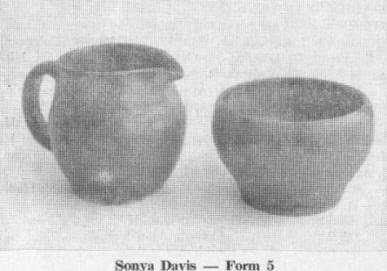 |
EXAMINATION RESULTS
GENERAL, CERTIFICATE OF EDUCATION
JUNE 1977
LONDON 'A' LEVEL
E. Chapman -- Art.
A. Copsey -- Economics, Physics.
D. Davies Ecnomics, English.
A. Dowie Physics, Biology, Chemistry.
A. Griffith -- English, French.
D. Helliwell History, English, Biology.
K. Lamb Home Economics.
M. Orr Maths, Physics.
A. 'Young - - English.
|
|
|
LONDON 'O' LEVEL
BOYS:
English Language: A. Ball, W. Bleakley, M. Corcoran,
S. Crickmay, G. Dimeck, M. Gatenby, T. Johnson, P. Kit-son,
M. Lane, C. Wedlock. G. Bell.
English Literature: M. Attrill, M. Clark, G. Dimeck,
A. Groves, I. Rowbottom, G. Smyth.
Maths: A. Bell, L. Bower, M. Clark, D. Cox, S. Cox,
ML Gatenby, A. Groves, I. Hewett, T. Johnson, P. Kitson, K
McCosh, A. Madge, R. Norris, I. Rowbottom, C. Sampson, G.
Bell, G. Smyth.
Art: M. Attrill, W. Bleakiey, C. Elwis, N. Hall, V.
Helliwell, B. Male, A. Perry, P. Sheppard.
Geography: M. Attrill, W. Bleakley, L. Bower, G. Di-|
meek, M. Gatenby, A. Groves, I. Hewett, A. Jackson, P.
Kit-son, R. Norris, G. Smyth.
British Constitution: M. Attrill.
Biology: M. Booth, M. Clark, V. Helliwell, P. Kitson,
RJ Norris, S. Oliver, I. Rowbottom, G. Smyth.
Physics: L. Bower, S. Cox, M. Gatenby, A. Groves, ij
Hewett, T. Johnson, V. Heiliwell, P. Kitson, R. McCosh, RJ
Norris, S. Oliver, I. Rowbottom, G. Bell, G. Smyth.
History: W. Bleakley, M. Clark, S. Crickmay, G.
Dimeckj M. Gatenby, A. Groves.
General Paper: D. Bonnar, A. Copsey, D. Davies, MJ
Orr.
Technical Drawing: M. Booth, D. Cox, S. Cox, M. Ga-j
tenby, A. Groves, I. Hewett, P. Kitson, B. Male, R. Norris]
S. Oliver, G. Smyth.
Chemistry: L. Bowser, M. Clark, A. Groves, T. John
son, V. Helliwell, P. Kitson, K. McCosh, I. Rowbottom, G
Smyth.
Religious Studies: C. Brennan, M. Lane, B. Male.
Music: M. Clark.
French: M. Clark, P. Kitson, R. Norris, G. Smyth.
German: M. Clark.
Spanish M, Clark.
Nuffield Physics: A. Madge.
Commerce: G. Tall.
OXFORD 'O'
LEVEL
Woodwork: M. Beresford, C. Elwis, M. Hall, T.
Johnson, K. McCosh.
Engineering: M. Gatenby, T. Johnson. Ceramics: P.
Egan, M. Lane.
English Literature: A. Madge.
History: A. Madge.
Chemistry: A. Madge |
GIRLS:
Food and Nutrition: S. Bloom, J. Cohring, P.
Fairdough, K. Hanns, H.H. Hipperson, R. Le Quesne, H.
Lewington, M. McKay, D. Smeeton, G. Spanton.
Geography: J. Barnes, S. Bloom, P. Buick, S. Carter,
J. Cohring, H. Lewington, K. McKay, L. Mack, R. Mortimer, A.
Rodgers, D. Ruff, B. Shaw, G. Spanton, A. Wardle.
Physics: J. Barnes, H. Lewington, F. Rendle, A.
Rod¬gers, D. Ruff.
Maths: J. Barnes, S. Campbell, P. Fairclough, K.
Hanns, L. Mack, L. Moody, F. Rendle, D. Ruff, D. Smeeton.
Needlecraft and Dress: F. Buick, J. Hartley, L.
Moody, F. Rendle, A. Rodgers, J. Stace, C. Vernon.
English Literature: S. Campbell, J. Cohring, L.
Davies, H. Lewington, S. Mackinnon, L. Mack, R. Mortimer, A.
Rod¬gers, D. Ruff, M. Simpson, G. Spanton.
Art: S. Bloom, F. Buick, J. Cohring, L. Davies, G.
Fielding, K. Hanns, J. Hartley, R. Mortimer, F. Rendle, M.
Simpson, C. Vemon.
Biology: S. Bloom, J. Cohring, L. Mack, D. Ruff, D.
Smeeton, G. Spanton, A. Wardle.
English Language: S. Bloom, S. Brooke, S. Carter, P.
Fairclough, K. Fitches, F. Fogarty, A. Glenn, S. Johnson, T.
Kennard, K. McKay, P. Patterson, H. Ransom, C. Vernon, S.
Woods, T. Wood.
History: S. Bloom, S. Campbell, J. Cbhring, L.
Davies, H. Lewington, L. Mack, R. Mortimer, F. Rendle, A.
Rodgers, M. Simpson, D. Smeeton, G. Spanton.
Religous Studies: S. Burns, S. Campbell, J. Hartley,
M. Simpson, G. Spanton, A. Wardle.
Commerce: D. Canhan, S. Carter, H. Hipperson, R. Le
Quesne, R. Mortimer.
French: L. Davies, P. Fairclough, H. Lewington, L.
Mack, R. Markwell, R. Mortimer, F. Rendle, A. Rodgers.
German: L. Davies, R. Mortimer.
General Paper: L. Morris, J. Wiggins, A. Young.
Chemistry: H. Lewington.
Add. Maths: A. Rodgers
|
CERTIFICATE OF SECONDARY EDUCATION 1977
GIRLS
Z. Baker English, Maths, Chemistry, Physics, Biology.
J. Barnes -- English, Biology, Geography, Needlecraft. L.
Bendall - - English, Maths, Needlecraft, Parentcraft. S.
Bloom Maths, French, Geography.
F. Bevick Maths, History, Geography, Needlecraft.
S. Campbell - - Maths, Chemistry, History, Geography,
Needlecraft.
D. Canhan English, Maths, History, Geography, Needlecraft.
S. Carter - - Maths, French, German, History, Geography,
Needlecraft, Commerce.
I. Ciantar - - English, Maths, Chemistry, Physics, Commerce,
Technical Drawing.
G. Cleverley Maths, Parentcraft, Civics.
J. Cohring Maths, French, Biology, Geography.
D. Collins Parentcraft.
M. Cross Maths, Parentcraft
L. Davies Maths, Biology, History, Geography.
P. Fairclough - - English, Biology, History, Geography.
K. Forwood -- Maths, Parentcraft.
S. Fothergill Parentcraft.
T. Giles - - English, History, Geography, Parentcraft.
G. Graham English, Maths, French, Chemistry, Physics,
Biology, Geography, Needlecraft.
K. Hanns - - Maths, French, Biology, History, Geography
J. Hartley -- English, Maths, Biology, History, Geography,
Needlecraft.
S. Hewett English, Maths, French, Physics, Geography,
Commerce.
H. Hipperson English, Maths, French, Physics, Geography,
Commerce.
F. Jefferson Maths, Geography, Parentcraft.
S. Johnson Maths, Chemistry, Biology, History, Home
Economics
R. Le Quesne English, Maths, French, German, History,
Geography, Commerce.
D. Lewis English, Geography.
S. Long English, Biology, Home Economics.
L. Mack Geography.
S. Mackinnon History, Parentcraft.
S. Maloney -- Maths, Parentcraft Physics.
K. Markwell English, Parentcraft.
K. McKay English, Maths, Parentcraft, Civics.
Z. Mockford English, Geography, Parentcraft.
L. Moody English, Maths, French, Chemistry, Biology,
History, Geography, Needlecraft.
A. Morris Maths, History, Technical Drawing.
R. Mortimer Maths.
L. Murphy English, Maths, French, German, Chemistry,
Biology, History, Home Economics.
G. Painter English, History, Geography, Civics, Home
Economics.
K. Poulson -- English, Biology, History, Home Economics.
P. Rendle -- History, Geography, Needlecraft.
A. Rodgers -- History, Geography, Needlecraft.
D. Ruff - - French, Physics, Biology, Geography.
A. Ryan English, Biology, History.
B. Shaw Parentcraft
M. Simpson Maths, Chemistry, Biology, Geography
D. Smeeton -- English, French, Chemistry, Biology.
B. Smith -- Maths, History, Parentcraft.
J. Smith - - Parentcraft, Civics.
G. Spanton Maths, Biology, Geography.
D. Smeeton - - English, French, Chemistry, Biology.
B. Smith Maths, History, Parentcraft.
J. Smith -- Parentcraft, Civics.
G. Spanton -- Maths, Biology, Geography.
P. Spencer Home Economics, English.
A. Stirton Biology, English, History, Geography,
Parentcraft.
C. Vernon - - Biology, History, Geography, Maths, French,
Needlecraft.
A. Wardle -- Home Economics, Biology. English, Chemistry,
Geography, Maths Needlecraft.
E. Watts History, Civics.
|
BOYS
M. Attrill Maths, Technical Drawing, Civics.
S. Barr - - English, History, Geography.
A. Basson English, Maths, Chemistry, Biology, Physics,
Civics.
G. Bell - - Chemistry, History, Geography, T.R. Religious
Studies.
M. Beresford - - English, Maths, French, Physics, History,
Geography, T.D. Woodwork.
W. Bleakley -- Maths, French, Biology, Geography.
M. Booth - - English, Maths, Chemistry, Biology, History,
T.D. Religious Studies.
L. Bower - - English, Maths, Chemistry, Physics, History,
T.D. Civics.
C. Brennan English, Maths, Chemistry, Physics, History,
Geography, Religious Studies.
M. Clark Spanish.
G. Cleverley English, Maths, German, Chemistry, Biology,
History, Metalwork, Civics.
M. Corcoran - - English, Maths, French, History, Geography
T.D.
D. Cox English, Chemistry, Physics, Woodwork.
S. Cox English, Chemistry, Woodwork.
S. Crickmay - - English, Maths, Chemistry, Woodwork. G.
Dimeck -- Maths. T.D. Civics. P. Egan Maths, T.D. Civics.
C. Elwis -- Maths, English, Physics, Geography, T.D.
Civics, Woodwork.
J. Fisher - - English, Maths, French, Chemistry, Physics,
History, Geography.
M. Gatenby -- French, History, T.D.
D. Green -- English, Chemistry, Biology, Physics, Geography,
Home Economics.
A. Groves T.D. Civics.
M. Hall - - Maths, Chemistry, Physics, Civics, Woodwork.
N. Hall English, Maths, Biology, Physics, Geography,
Civics, Woodwork.
V. Helliwell -- English, Maths, Chemistry, T.D. Civics.
I. Hewett -- English French, Chemistry, History, T.D.
P. Hobson - - English, Biology, Physics, Religious Studies.
A. Jackson English, Maths, Chemistry, Physics, History,
Geography, T.D., Civics.
T. Johnson English, French, T.D. Metalwork, Woodwork.
K. Kiddle Maths.
P. Kitson T.D.
J. Lambert English, Maths, French, Chemistry, Phy¬sics,
History, Geography, Metalwork.
M. Lane Physics.
B. Male English, Maths, Chemistry, Physics, History, T.D.
Religious Studies.
K. McCosh English, French, Chemistry, Biology, Woodwork.
G. Millar English, Maths, Physics, History, Geography, T.D.
Metalwork.
R. Norris -- English, Geography, T.D. Metalwork.
S. Oliver - - English, Maths, Geography, T.D. Civics,
Woodwork.
A. Perry - - English, Maths, History, Geography, T.D.
Woodwork, Religious Studies.
I. Rowbottom -- Civics.
J. Russell - English, Maths, Chemistry, Biology, Physics,
T.D. Religious Studies.
P. Sheppard -- English, Maths, Physics, Geography, History,
Civics.
G. Smyth T.D.
P. Stanford -- English, Chemistry, T.D. Metalwork, Civics,
Woodwork.
J. Storry English, Maths, Chemistry, Geography, T.D.
Civics, Woodwork.
G. Tall Geography, T.D. Civics.
D. Virden - - English, Maths, Chemistry, Physics, History,
Geography, Religious Studies.
C. Wedlock Chemistry, Biology, Physics, T.D. Civics.
Woodwork.
COMMERCIAL SUBJECTS JUNE 1977 PITMAN EXAM:
Pitmanscript J. Barnes, S. Fothergill, K. McKay, K. Lamb.
R.S.A. JUNE 1977
Stage I Elementary Typewriting F. Jefferson, L. Mor¬ris,
L. Bendall, K. Davies, S. Johnson, G. Fielding, K. Lamb.
Stage II Intermediate Typewriting E. Watts, J. Barnes.
Stage in Advanced Typewriting B. Shaw.
R.S.A. EASTER 1977
Stage I Elementary Typewriting - - J. Barnes, T. Giles, J.
Dawson.
R.S.A. WHITSUN 1977
Stage I Elementary I. Ciantar, F. Buick, K. For-wood, S.
Maloney, J. Smith, A. Griffith. Stage II Intermediate J.
Barnes.
R.S.A. SUMMER 1977
Stage I Elementary - - F. Jefferson, L. Morris, L. Bendall,
K. Davies, S. Johnson, G. Fielding, K. Lamb. Stage II
Intermediate J. Barnes, E, Watts. Stage HI Advanced B.
Shaw.
AUTUMN
Stage I Elementary H. Merritt, K. Hartley.
C. Whitehead Biology, Geography, Civics.
K. Williams English, History, Civics, Woodwork.
|
|
Autographs |
Autographs
|
STEAMSHIP CLEARING,
FORWARDING, INSURANCE
AND TOURIST AGENTS,
AGENTS FOR ADMIRALTY
CHARTS AND OTHER
HYDROGRAPHICAL
PUBLICATIONS.
AUTOMOBILE ASSOCIATION
REPRESENTATIVES.
THOS. C. SMITH & CO. LTD
12, ST. CHRISTOPHER STREET, VALLETTA.
Telephone: 625071-28180
Cables: SMITH MALTA Telex: MW 272 SMITH 272
|
 |
Back to top
|
![]()
![]()
![]() Contributed by
Martin
Powell Old
Staff & Pupils
Contributed by
Martin
Powell Old
Staff & Pupils 




